Jason Y. Ng's Blog
August 28, 2017
Seeing Joshua 探之鋒
“We are here to visit a friend,” I said to the guard at the entrance.
Tiffany, Joshua Wong Chi-fung’s long-time girlfriend, trailed behind me. It was our first time visiting Joshua at Pik Uk Correctional Institution and neither of us quite knew what to expect.
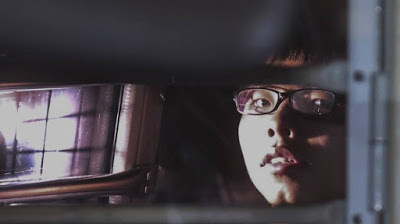 Joshua Wong, behind bars
Joshua Wong, behind bars
“Has your friend been convicted?” asked the guard. We nodded in unison. There are different visiting hours and rules for suspects and convicts. Each month, convicts may receive up to two half-hour visits from friends and family, plus two additional visits from immediate family upon request.
The guard pointed to the left and told us to register at the reception office. “I saw your taxi pass by earlier,” he said while eyeing a pair of camera-wielding paparazzi on the prowl. “Next time you can tell the driver to pull up here to spare you the walk.”
At the reception counter, Officer Wong took our identity cards and checked them against the “List.” Each inmate is allowed to grant visitation rights to no more than 10 friends and family members—anyone not on the List will be turned away. Tiff was confidant that both of our names had been added; she had triple-checked that with Joshua’s attorney ahead of time.
“Miss, you’re okay. But the second visitor, Mr. Ng, your name doesn’t quite match our record. The inmate submitted a slightly different Chinese surname,” said Officer Wong. I knew about Joshua’s dyslexic tendencies.
“But don’t worry,” the officer assured, “I can fix that for you if you would just give me a minute.”
I thanked him and asked if I could bring pen and paper with me.
“Sorry, but no phone, no notebook, no nothing—you can’t bring anything in other than your ID card. Rules are rules.”
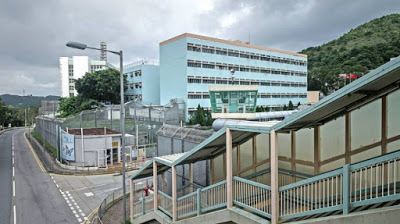 Pik Uk Prison in Sai Kong
Pik Uk Prison in Sai Kong
Tiff and I exited the reception office and headed straight to the main building, almost sprinting to evade the two relentless paparazzi. Once inside, we deposited our belongings in a locker and walked through an X-ray gantry much like the ones at the airport. Tiff held on to a bag of personal supplies for Joshua.
Visitors are permitted to bring basic items for inmates, but they must meet stringent prison requirements. Tiff knew the only way to guarantee compliance was to purchase everything—from notebooks to batteries and undergarment—at the general store near Lai Chi Kok Reception Centre, where Joshua and the other two convicted student activists, Nathan Law Kwun-chung and Alex Chow Yong-kang, spent their first night after their sentencing.
We were told to take a seat and wait for our number to be called. There were a half-dozen other visitors in the waiting room. Tiff and I entertained ourselves by watching the news on the overhead television set. Paul Lam, Chairman of the Hong Kong Bar Association, was telling reporters that the jailing of Joshua and other activists was not politically motivated. Tiff rolled her eyes and focused on something else.
15 minutes later, an officer called out several numbers including ours. Everyone in the waiting room got up and walked in a single file towards the narrow visiting area. Tiff and I located Joshua’s booth and there he was: the same scrawny boy with a different haircut. He flashed a Cheshire cat smile, clearly elated to see his girlfriend. In an instant, I went from second visitor to third wheel.
Tiff picked up the handset and started to chirp. I saw Joshua’s lips move but couldn’t hear him. The thick glass walls separating prisoners from visitors were certifiably soundproof. What did come through, however, was his good spirits—none of the prison weariness had rubbed off on him.
Tiff spoke in rapid-fire spurts, updating Joshua on personal and political matters with determined efficiency. She also referred to the notes scribbled on her palms. Joshua alternately nodded and spoke, all the while smiling like a kid seeing snowflakes for the first time. If it weren’t for his brown prison clothes, I wouldn’t have guessed that he was serving a six-month sentence.
While they talked, a smiling prison guard saw me standing behind Tiff and walked over to offer me a chair. I declined but thanked him profusely.
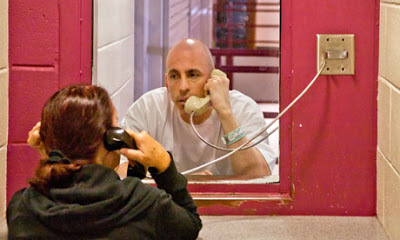 As seen on TV
As seen on TV
“Your turn,” Tiff said, handing me the handset after some 10 minutes. Mindful that every second I took would be one fewer for the two of them, I rushed through what I needed to discuss with Joshua. I also told him about Typhoon Hato and Chris Patten’s article in The Financial Times condemning his imprisonment. He nodded—I suspected he already knew all that from watching the news on TV.
I was most concerned about Joshua’s living conditions and bombarded him with questions. He told me the juvenile ward was surprisingly airy, and that most nights he could barely feel the summer heat. “I even need a thin blanket at night,” he said. “It’s much better than sleeping on concrete during Occupy.”
The food is nothing to write home about: plain rice, chicken wings and steamed vegetables. He shares a tiny cell with another minor inmate, who was convicted for illegal drug use—as most juvenile delinquents at Pik Uk were.
I asked him about any abuse, and he assured me there had been none whatsoever. He had just completed a seven-day “orientation” and a new routine would begin next week. He was expected to begin language and maths classes with other young inmates. He worried somewhat about the physical training—jogging and marching—as he isn’t the athletic type and doesn’t answer well to strict commands.
I asked him what the hardest part was about being behind bars. “Passing the time,” he sighed. “Time crawls in here. Every day I rack my brain to keep myself occupied.” He had nearly finished the six books that visitors are allowed to bring him each month.
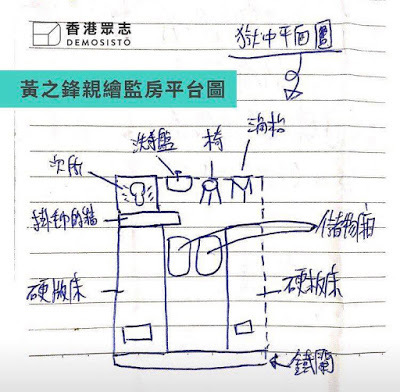 Joshua's cell, drawn by him
Joshua's cell, drawn by him
I wanted to know if he had a message for his supporters.
“Please tell everyone I’m doing fine and not to worry about me. Instead, ask them to help Demosisto in any way they can,” he said, referring to his pro-democracy political party.
“The majority of our core members are, or will soon be, in jail,” he added, shaking his head in frustration. “We need to keep our party running and get ready for the upcoming by-election to fill Nathan’s Legco seat.” Weeks before Demosisto’s chairman Nathan Law Kwun-chung went to prison, he was striped of his lawmaker title for straying from the prescribed oath when he was sworn in.
“Among all the opposition parties in Hong Kong, we have come under the heaviest attack. But we won’t give up.” There was indignation and defiance in his voice.
The rest of the 30 minutes went by quickly. We knew time was up when several uniformed officers suddenly appeared to escort the inmates back to their cells. Joshua got up and waved goodbye, training his eyes on Tiff and still smiling from ear to ear. It was sweet and heartbreaking at once.
On our way back to town, I replayed the visit in my head. All things considered, Joshua has adjusted well to the new environment. As much as he struggles to pass the time, his timetable will fill up once his habit of journal keeping and letter writing takes hold and he gets his radio and newspaper subscription.
What’s more, based on my limited interaction with the staff, everyone in the juvenile ward seemed to be courteous and helpful. Nothing suggested Joshua was being treated with anything but respect and professionalism. That’s a marked departure from the many horror stories about youth incarceration I’ve read in the local press. Perhaps his fame had afforded him some protection.
All that may change after Joshua turns 21 in October, when he will be transferred to the adult ward. There, he will be required to work every day—be it carpentry, laundry, kitchen duties or repairs and maintenance—to earn his keep. And he will have to adapt to a new routine all over again.
____________________________________
A shorter version of this article appeared on SCMP.com under the title "Behind bars, Hong Kong political activist Joshua Wong remains in good spirits."
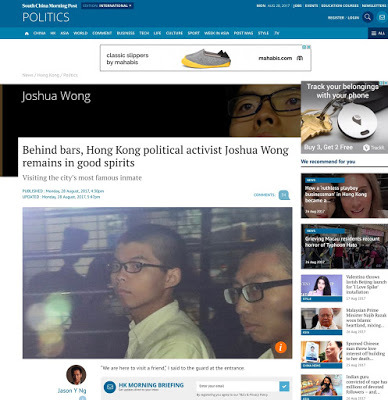 As posted on SCMP.com
As posted on SCMP.com
Tiffany, Joshua Wong Chi-fung’s long-time girlfriend, trailed behind me. It was our first time visiting Joshua at Pik Uk Correctional Institution and neither of us quite knew what to expect.
 Joshua Wong, behind bars
Joshua Wong, behind bars“Has your friend been convicted?” asked the guard. We nodded in unison. There are different visiting hours and rules for suspects and convicts. Each month, convicts may receive up to two half-hour visits from friends and family, plus two additional visits from immediate family upon request.
The guard pointed to the left and told us to register at the reception office. “I saw your taxi pass by earlier,” he said while eyeing a pair of camera-wielding paparazzi on the prowl. “Next time you can tell the driver to pull up here to spare you the walk.”
At the reception counter, Officer Wong took our identity cards and checked them against the “List.” Each inmate is allowed to grant visitation rights to no more than 10 friends and family members—anyone not on the List will be turned away. Tiff was confidant that both of our names had been added; she had triple-checked that with Joshua’s attorney ahead of time.
“Miss, you’re okay. But the second visitor, Mr. Ng, your name doesn’t quite match our record. The inmate submitted a slightly different Chinese surname,” said Officer Wong. I knew about Joshua’s dyslexic tendencies.
“But don’t worry,” the officer assured, “I can fix that for you if you would just give me a minute.”
I thanked him and asked if I could bring pen and paper with me.
“Sorry, but no phone, no notebook, no nothing—you can’t bring anything in other than your ID card. Rules are rules.”
 Pik Uk Prison in Sai Kong
Pik Uk Prison in Sai KongTiff and I exited the reception office and headed straight to the main building, almost sprinting to evade the two relentless paparazzi. Once inside, we deposited our belongings in a locker and walked through an X-ray gantry much like the ones at the airport. Tiff held on to a bag of personal supplies for Joshua.
Visitors are permitted to bring basic items for inmates, but they must meet stringent prison requirements. Tiff knew the only way to guarantee compliance was to purchase everything—from notebooks to batteries and undergarment—at the general store near Lai Chi Kok Reception Centre, where Joshua and the other two convicted student activists, Nathan Law Kwun-chung and Alex Chow Yong-kang, spent their first night after their sentencing.
We were told to take a seat and wait for our number to be called. There were a half-dozen other visitors in the waiting room. Tiff and I entertained ourselves by watching the news on the overhead television set. Paul Lam, Chairman of the Hong Kong Bar Association, was telling reporters that the jailing of Joshua and other activists was not politically motivated. Tiff rolled her eyes and focused on something else.
15 minutes later, an officer called out several numbers including ours. Everyone in the waiting room got up and walked in a single file towards the narrow visiting area. Tiff and I located Joshua’s booth and there he was: the same scrawny boy with a different haircut. He flashed a Cheshire cat smile, clearly elated to see his girlfriend. In an instant, I went from second visitor to third wheel.
Tiff picked up the handset and started to chirp. I saw Joshua’s lips move but couldn’t hear him. The thick glass walls separating prisoners from visitors were certifiably soundproof. What did come through, however, was his good spirits—none of the prison weariness had rubbed off on him.
Tiff spoke in rapid-fire spurts, updating Joshua on personal and political matters with determined efficiency. She also referred to the notes scribbled on her palms. Joshua alternately nodded and spoke, all the while smiling like a kid seeing snowflakes for the first time. If it weren’t for his brown prison clothes, I wouldn’t have guessed that he was serving a six-month sentence.
While they talked, a smiling prison guard saw me standing behind Tiff and walked over to offer me a chair. I declined but thanked him profusely.
 As seen on TV
As seen on TV“Your turn,” Tiff said, handing me the handset after some 10 minutes. Mindful that every second I took would be one fewer for the two of them, I rushed through what I needed to discuss with Joshua. I also told him about Typhoon Hato and Chris Patten’s article in The Financial Times condemning his imprisonment. He nodded—I suspected he already knew all that from watching the news on TV.
I was most concerned about Joshua’s living conditions and bombarded him with questions. He told me the juvenile ward was surprisingly airy, and that most nights he could barely feel the summer heat. “I even need a thin blanket at night,” he said. “It’s much better than sleeping on concrete during Occupy.”
The food is nothing to write home about: plain rice, chicken wings and steamed vegetables. He shares a tiny cell with another minor inmate, who was convicted for illegal drug use—as most juvenile delinquents at Pik Uk were.
I asked him about any abuse, and he assured me there had been none whatsoever. He had just completed a seven-day “orientation” and a new routine would begin next week. He was expected to begin language and maths classes with other young inmates. He worried somewhat about the physical training—jogging and marching—as he isn’t the athletic type and doesn’t answer well to strict commands.
I asked him what the hardest part was about being behind bars. “Passing the time,” he sighed. “Time crawls in here. Every day I rack my brain to keep myself occupied.” He had nearly finished the six books that visitors are allowed to bring him each month.
 Joshua's cell, drawn by him
Joshua's cell, drawn by himI wanted to know if he had a message for his supporters.
“Please tell everyone I’m doing fine and not to worry about me. Instead, ask them to help Demosisto in any way they can,” he said, referring to his pro-democracy political party.
“The majority of our core members are, or will soon be, in jail,” he added, shaking his head in frustration. “We need to keep our party running and get ready for the upcoming by-election to fill Nathan’s Legco seat.” Weeks before Demosisto’s chairman Nathan Law Kwun-chung went to prison, he was striped of his lawmaker title for straying from the prescribed oath when he was sworn in.
“Among all the opposition parties in Hong Kong, we have come under the heaviest attack. But we won’t give up.” There was indignation and defiance in his voice.
The rest of the 30 minutes went by quickly. We knew time was up when several uniformed officers suddenly appeared to escort the inmates back to their cells. Joshua got up and waved goodbye, training his eyes on Tiff and still smiling from ear to ear. It was sweet and heartbreaking at once.
On our way back to town, I replayed the visit in my head. All things considered, Joshua has adjusted well to the new environment. As much as he struggles to pass the time, his timetable will fill up once his habit of journal keeping and letter writing takes hold and he gets his radio and newspaper subscription.
What’s more, based on my limited interaction with the staff, everyone in the juvenile ward seemed to be courteous and helpful. Nothing suggested Joshua was being treated with anything but respect and professionalism. That’s a marked departure from the many horror stories about youth incarceration I’ve read in the local press. Perhaps his fame had afforded him some protection.
All that may change after Joshua turns 21 in October, when he will be transferred to the adult ward. There, he will be required to work every day—be it carpentry, laundry, kitchen duties or repairs and maintenance—to earn his keep. And he will have to adapt to a new routine all over again.
____________________________________
A shorter version of this article appeared on SCMP.com under the title "Behind bars, Hong Kong political activist Joshua Wong remains in good spirits."
 As posted on SCMP.com
As posted on SCMP.com
Published on August 28, 2017 03:38
July 28, 2017
Major Yuen to Ground Control 自袁其說
Seven years after Donald Tsang’s administration rammed a funding bill through the legislature to bankroll the cross-border rail link, the SAR government this week unveiled a long-awaited proposal to resolve the border control conundrum. At issue is whether carving out certain areas at the West Kowloon terminal station where mainland officers are given broad criminal and civil jurisdiction will run afoul of the Basic Law, Hong Kong’s mini-constitution.
It is an 84-billion-dollar question that can make or break the controversial infrastructure project. If the government’s proposal falls through, then every time-saving and convenience advantage to justify the rail link’s dizzying price tag is put at risk. But if the plan prevails, it may create a foreign concession of sorts in Hong Kong and open a Pandora’s box of extraterritorial law enforcement.
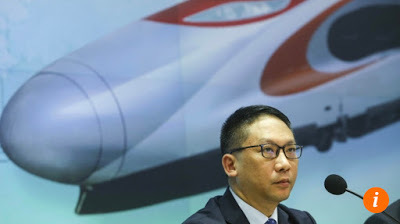 Justice Secretary Rimsky Yuen
Justice Secretary Rimsky Yuen
The central question is a straightforward one: is the joint checkpoint proposal constitutional?
The answer can be found in Chapter II of the Basic Law which governs the relationship between mainland China and Hong Kong. Articles 18 and 22 prohibit national laws from being applied in Hong Kong (with the exception of matters relating to defence and foreign affairs) and forbid Chinese authorities from interfering in the special administrative region’s affairs. In addition, Article 19 grants Hong Kong courts exclusive jurisdiction over cases that occur anywhere within the territory. That means any attempt to enforce Chinese law on Hong Kong soil—no matter the location or size of the area—is on its face in breach of at least three provisions of the Basic Law.
But the government begs to differ. Justice Secretary Rimsky Yuen Kwok-keung (袁國強) has so far put forward two counter-arguments. First, he argues that the designated areas, once leased to the Central Government, will no longer be part of the SAR territory and therefore outside the jurisdiction of the Basic Law.
Yuen’s argument is plainly circular, especially if you recast his logic as follows: it is constitutional to carve out certain areas because those areas have been carved out of the constitution. If that were true, then by analogy there would be nothing to stop the government from excluding, say, left-handed people from the protection of the Basic Law on the basis that those people will have no such protection once they are excluded.
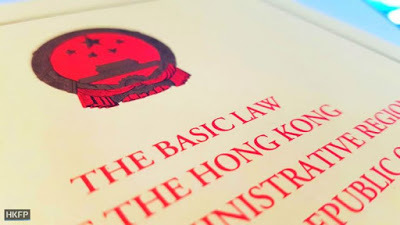 Does this mean anything to anyone any more?
Does this mean anything to anyone any more?
Second, the Justice Chief invokes Article 20 of the Basic Law, which allows the SAR government to enjoy new powers conferred to it by the National People’s Congress Standing Committee (NPCSC). Bending that provision to serve his purpose, Yuen argues that the SAR government can seek a “new power” from the NPCSC under Article 20 so that it can in turn authorize the mainland authorities to enforce national laws in the designated areas.
In essence, Yuen is asking Beijing to give Hong Kong the power to give Beijing the power to do what Beijing doesn’t currently have the power to do in Hong Kong. Mr. Secretary should get an “A” for creativity and an “F” for logic.
Such illogic aside, many are asking how constitutional lawyers have gotten comfortable with seemingly similar arrangements enjoyed by foreign consulates and “mainland-controlled” areas like the Liaison Office in Sai Ying Pun and the People’s Liberation Army Garrison in Tamar.
Foreign consulates are specifically dealt with in Annex III to the Basic Law, which imports Chinese regulations governing diplomatic privileges in compliance with the Vienna Convention on Consular Relations. Even so, consuls and their staff only enjoy diplomatic rights and not law enforcement powers. What’s more, Hong Kong courts still have full jurisdiction over any illegal acts committed on those premises. The same is true for the Liaison Office and the PLA Garrison.
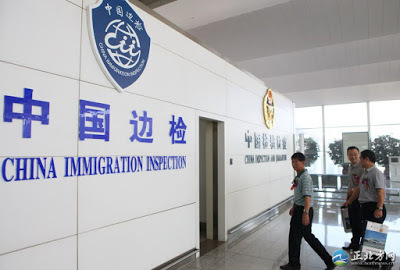 Expect to see this in the heart of Hong Kong
Expect to see this in the heart of Hong Kong
Then how do other countries address similar issues in their extraterritorial checkpoints, such as the passport control at London’s Eurostar terminal and the U.S. immigration controls at Canadian airports? The answer is simple: they don’t have to. Sovereign nations are free to enter into any border control arrangements with each other as they see fit, because their relationship is not bound by the Basic Law. But ours is.
If the joint checkpoint proposal violates the Basic Law, the next question becomes: are there less invasive alternatives?
Commentators and advocacy groups have tabled a number of options, one of them is to limit the mainland officers’ powers to the performance of immigration and customs controls only, instead of the full criminal and civil jurisdiction currently being proposed. While this scaled-back arrangement still won’t pass constitutional muster, it will at least allay fears that mainland authorities stationed in the heart of Hong Kong may arrest and detain passengers at will—fears that are understandable considering that the missing booksellers incident is still fresh on everyone’s mind.
The most legally viable alternative so far is one that involves a combination of ground and on-board clearance procedures. Based on the current rail network, high-speed trains leaving West Kowloon must make a first stop in either Shenzhen or Guangzhou. Under the “combined approach”, Hong Kong passengers whose final destination is one of those two cities will exit the train and go through a physical checkpoint upon arrival. Those who continue their journey to other destinations will stay in their seats and await immigration officers to check their documents and luggage on board while the train is in transit to the next city.
On-board clearance is typical in Europe and does not cause any travel delay to passengers regardless of their destinations. However, the combined approach will incur additional expenses on the mainland side by requiring physical checkpoints to be set up in Shenzhen and Guangzhou. Therein lies the conflict of interest: mainland authorities see no reason why they should bear any of the cost of linking Hong Kong to their massive high-speed rail system. Hong Kong citizens are the ones who need to figure things out for themselves.
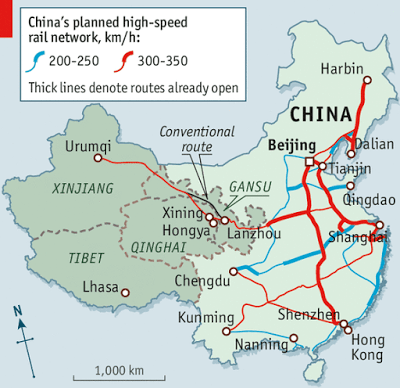 China's high speed rail network
China's high speed rail network
In the coming months, legal experts and government officials will continue to argue over the legality of the joint checkpoint proposal. Already, at least two judicial reviews have been filed to challenge it in local courts. Whereas complicated legal issues may be of little interest to the majority of citizens who prize convenience and connectivity above constitutional principles, they matter even less to the SAR government. For the bureaucrats know, if the stalemate should go on any longer, the NPCSC will have no qualms about issuing yet another interpretation of the Basic Law, just as it so eagerly did before using it to unseat a half-dozen opposition lawmakers who had strayed from their oaths.
That explains the Justice Secretary’s confidence in the rail plan. He too knows that no matter what unsound arguments he puts forth, Beijing will always have the last word. But each time the NPCSC uses its trump card, it chips away at the authority of the Basic Law and make the “one country, two systems” promise mean a little less. And it is again the citizens of Hong Kong who will pay the price—in dollars and in dignity.
____________________________________
This article appeared on SCMP.com as " Why Hong Kong’s justice minister Rimsky Yuen is so sanguine about joint checkpoint for express rail link " and in the South China Morning Post print edition as "Unsound logic from justice chief on express rail checkpoint."
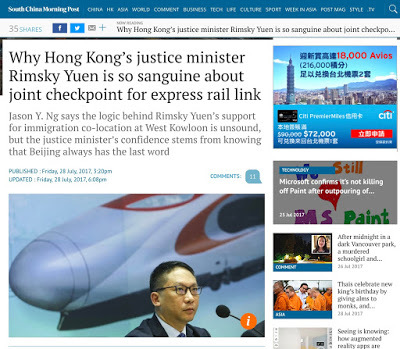 As posted on SCMP.com
As posted on SCMP.com
It is an 84-billion-dollar question that can make or break the controversial infrastructure project. If the government’s proposal falls through, then every time-saving and convenience advantage to justify the rail link’s dizzying price tag is put at risk. But if the plan prevails, it may create a foreign concession of sorts in Hong Kong and open a Pandora’s box of extraterritorial law enforcement.
 Justice Secretary Rimsky Yuen
Justice Secretary Rimsky YuenThe central question is a straightforward one: is the joint checkpoint proposal constitutional?
The answer can be found in Chapter II of the Basic Law which governs the relationship between mainland China and Hong Kong. Articles 18 and 22 prohibit national laws from being applied in Hong Kong (with the exception of matters relating to defence and foreign affairs) and forbid Chinese authorities from interfering in the special administrative region’s affairs. In addition, Article 19 grants Hong Kong courts exclusive jurisdiction over cases that occur anywhere within the territory. That means any attempt to enforce Chinese law on Hong Kong soil—no matter the location or size of the area—is on its face in breach of at least three provisions of the Basic Law.
But the government begs to differ. Justice Secretary Rimsky Yuen Kwok-keung (袁國強) has so far put forward two counter-arguments. First, he argues that the designated areas, once leased to the Central Government, will no longer be part of the SAR territory and therefore outside the jurisdiction of the Basic Law.
Yuen’s argument is plainly circular, especially if you recast his logic as follows: it is constitutional to carve out certain areas because those areas have been carved out of the constitution. If that were true, then by analogy there would be nothing to stop the government from excluding, say, left-handed people from the protection of the Basic Law on the basis that those people will have no such protection once they are excluded.
 Does this mean anything to anyone any more?
Does this mean anything to anyone any more?Second, the Justice Chief invokes Article 20 of the Basic Law, which allows the SAR government to enjoy new powers conferred to it by the National People’s Congress Standing Committee (NPCSC). Bending that provision to serve his purpose, Yuen argues that the SAR government can seek a “new power” from the NPCSC under Article 20 so that it can in turn authorize the mainland authorities to enforce national laws in the designated areas.
In essence, Yuen is asking Beijing to give Hong Kong the power to give Beijing the power to do what Beijing doesn’t currently have the power to do in Hong Kong. Mr. Secretary should get an “A” for creativity and an “F” for logic.
Such illogic aside, many are asking how constitutional lawyers have gotten comfortable with seemingly similar arrangements enjoyed by foreign consulates and “mainland-controlled” areas like the Liaison Office in Sai Ying Pun and the People’s Liberation Army Garrison in Tamar.
Foreign consulates are specifically dealt with in Annex III to the Basic Law, which imports Chinese regulations governing diplomatic privileges in compliance with the Vienna Convention on Consular Relations. Even so, consuls and their staff only enjoy diplomatic rights and not law enforcement powers. What’s more, Hong Kong courts still have full jurisdiction over any illegal acts committed on those premises. The same is true for the Liaison Office and the PLA Garrison.
 Expect to see this in the heart of Hong Kong
Expect to see this in the heart of Hong KongThen how do other countries address similar issues in their extraterritorial checkpoints, such as the passport control at London’s Eurostar terminal and the U.S. immigration controls at Canadian airports? The answer is simple: they don’t have to. Sovereign nations are free to enter into any border control arrangements with each other as they see fit, because their relationship is not bound by the Basic Law. But ours is.
If the joint checkpoint proposal violates the Basic Law, the next question becomes: are there less invasive alternatives?
Commentators and advocacy groups have tabled a number of options, one of them is to limit the mainland officers’ powers to the performance of immigration and customs controls only, instead of the full criminal and civil jurisdiction currently being proposed. While this scaled-back arrangement still won’t pass constitutional muster, it will at least allay fears that mainland authorities stationed in the heart of Hong Kong may arrest and detain passengers at will—fears that are understandable considering that the missing booksellers incident is still fresh on everyone’s mind.
The most legally viable alternative so far is one that involves a combination of ground and on-board clearance procedures. Based on the current rail network, high-speed trains leaving West Kowloon must make a first stop in either Shenzhen or Guangzhou. Under the “combined approach”, Hong Kong passengers whose final destination is one of those two cities will exit the train and go through a physical checkpoint upon arrival. Those who continue their journey to other destinations will stay in their seats and await immigration officers to check their documents and luggage on board while the train is in transit to the next city.
On-board clearance is typical in Europe and does not cause any travel delay to passengers regardless of their destinations. However, the combined approach will incur additional expenses on the mainland side by requiring physical checkpoints to be set up in Shenzhen and Guangzhou. Therein lies the conflict of interest: mainland authorities see no reason why they should bear any of the cost of linking Hong Kong to their massive high-speed rail system. Hong Kong citizens are the ones who need to figure things out for themselves.
 China's high speed rail network
China's high speed rail networkIn the coming months, legal experts and government officials will continue to argue over the legality of the joint checkpoint proposal. Already, at least two judicial reviews have been filed to challenge it in local courts. Whereas complicated legal issues may be of little interest to the majority of citizens who prize convenience and connectivity above constitutional principles, they matter even less to the SAR government. For the bureaucrats know, if the stalemate should go on any longer, the NPCSC will have no qualms about issuing yet another interpretation of the Basic Law, just as it so eagerly did before using it to unseat a half-dozen opposition lawmakers who had strayed from their oaths.
That explains the Justice Secretary’s confidence in the rail plan. He too knows that no matter what unsound arguments he puts forth, Beijing will always have the last word. But each time the NPCSC uses its trump card, it chips away at the authority of the Basic Law and make the “one country, two systems” promise mean a little less. And it is again the citizens of Hong Kong who will pay the price—in dollars and in dignity.
____________________________________
This article appeared on SCMP.com as " Why Hong Kong’s justice minister Rimsky Yuen is so sanguine about joint checkpoint for express rail link " and in the South China Morning Post print edition as "Unsound logic from justice chief on express rail checkpoint."
 As posted on SCMP.com
As posted on SCMP.com
Published on July 28, 2017 08:02
July 19, 2017
FAQ on 4DQ 四議員宣誓案常見問題
The slow-motion disaster that is Oathgate has now spread from the pro-independence firebrands to the mainstream pro-democracy camp.
After the High Court disqualified localist lawmakers Yau Wai-ching (游蕙禎) and Baggio Leung Chung-hang (梁頌恆) nearly nine months ago, four more members of the Legislative Council (Legco) lost their jobs last Friday. Nathan Law Kwun-chung (羅冠聰), “Long Hair” Leung Kwok-hung (梁國雄), Lau Siu-lai (劉小麗) and Edward Yiu Chung-yim (姚松炎) had all strayed from the prescribed oath during the swearing-in ceremony. According to the supreme decision handed down by China’s National People’s Congress Standing Committee (NPCSC 人大常委會 ) in November, that minor infraction was enough for all of them to each get a pink slip.
If you are wondering how the loss of six seats has affected the balance of power in Hong Kong, you are not alone. The following FAQs are designed to answer that question and posit what is to come.
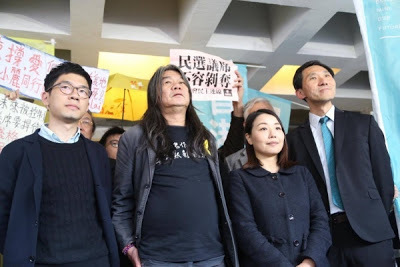 They're fired
They're fired
Walk me through the numbers before and after Oathgate?
There are a total of 70 seats in Legco, half of which are called “geographical constituencies” (GCs) and other half “functional constituencies” (FCs).
All 35 GCs are directly elected by a broad base of registered voters, which means GC lawmakers are mostly good folks who are accountable to their constituents. By contrast, most of the FCs (30 out of 35) are not democratically elected – they are handpicked by a small circle of committee members within a particular trade group, such as real estate, food and beverage, and retail. With the exception of a number of politically liberal groups like medical professionals, lawyers and social workers, the FC is stacked with pro-Beijing, pro-establishment businessmen who march in lockstep with the government.
Before Oathgate, the opposition held a total of 29 seats in Legco: 19 GCs and 10 FCs. Although the opposition was in the minority in Legco at large (29 out of 70) and within the FC (10 out of 35), they enjoyed a majority in the GC (19 out of 35). After losing six seats in two rounds of disqualification, the opposition is down to 23 seats: 14 GCs and 9 FCs. For the first time since the handover, they have lost their GC majority.
The following table summarises the impact of Oathgate to date:
Number of seats held by opposition Before Oathgate After Oathgate Geographical constituencies 19(majority) 14(minority) Functional constituencies 10(minority) 9(minority) Total 29(minority) 23(minority)
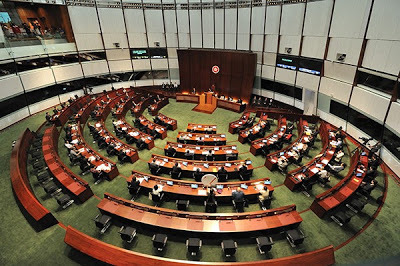 Balance of power shifted
Balance of power shifted
T he opposition has never enjoyed a majority in Legco even before Oathgate. What difference does losing six seats make?
Under the Basic Law, any bill introduced by the government (except for those relating to constitutional issues such as electoral reform or any amendment to the Basic Law) requires a simple majority vote in Legco. With or without Oathgate, the pro-establishment camp has enough votes to rubber stamp any government-led initiatives, such as an anti-subversion bill under Article 23 of the Basic Law or a funding proposal for the high-speed rail link to Shenzhen.
The only thing standing between us and bad government bills is the filibuster (which thwarted C.Y. Leung’s attempt in 2012 to create new ministerial positions to, critics say, enrich his political friends) and public outcry (which forced Tung Chee-hwa 董建華 to withdraw the controversial anti-subversion bill in 2003).
While Oathgate has not affected the overall balance of power in Legco vis-à-vis government-proposed bills, it has tipped the balance by handing the GC majority to the pro-establishment camp.
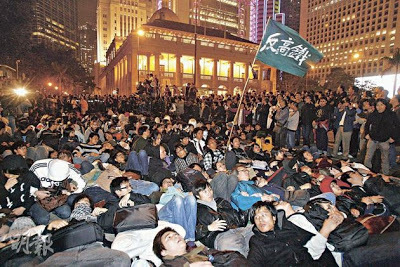 Protest against high-speed rail link
Protest against high-speed rail link
Why does losing the GC majority matter?
The Basic Law contains a bizarre voting rule called the “separate vote count” (分組點票). Unlike government-proposed bills that require a simple majority vote by all 70 Legco seats voting together, any bill introduced by an individual lawmaker must go through two rounds of voting: it must first be passed by the GC before being separately voted on by the FC.
Oathgate has created an opening for the pro-establishment camp to wreak havoc by proposing dangerous bills. Without its GC majority, the opposition has lost the ability to defeat bad bills introduced by their opponents. Going forward, any proposal floated by a lawmaker from the dark side will sail through both the GC and FC during the separate vote count.
One of the first things that the pro-establishment camp will do with its new GC majority is propose an amendment to voting procedures – a motion that only a lawmaker on the Committee on Rules of Procedure can initiate. The goal is to put an end to the filibuster by, for instance, putting a cap on how long or how many times a Legco member can speak when debating a bill or enabling the chairman to cut short the session and proceed to a vote. With both the GC and FC now controlled by Beijing loyalists, there is nothing to stop that amendment from being passed and the opposition can kiss the filibuster goodbye.
The filibuster is currently the opposition’s only effective weapon to delay or derail bad government bills such as funding requests for infrastructure projects that squander billions of taxpayer dollars. Thanks to Oathgate, we stand to lose the only checks and balances against the government led by a chief executive whom we play no part in choosing.
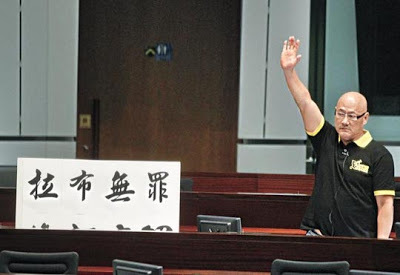 Albert Chan, one of the skilled filibusterers
Albert Chan, one of the skilled filibusterers
Does it mean the government can now pass an anti-subversion law without any resistance?
Remember, any bill introduced by the government, including the anti-subversion bill under Article 23 of the Basic Law, requires only a simple majority vote of all 70 LegCo members voting together. Since the pro-establishment has always enjoyed a majority in Legco at large, the opposition never has sufficient votes to block that bill from being passed whether or not they have those six seats.
As mentioned earlier, the only things stopping the pro-establishment camp from passing the much-dreaded bill are the filibuster – which is now in jeopardy – and public pressure. The latter remains an effective deterrence because the SAR government cannot afford a repeat of the political crisis that rattled the city in 2003.
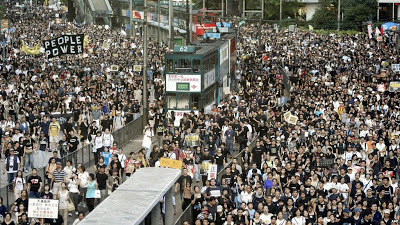 Epic July 1st march in 2003
Epic July 1st march in 2003
Why don’t the disqualified lawmakers simply appeal the court rulings?
First, the chances that the High Court rulings will be reversed or set aside are slim. NPCSC decisions are meant to be the ultimate interpretation of the Basic Law and binding on all levels of local courts. As much as appellant court judges may be sympathetic to the opposition’s arguments, their hands are tied.
Second, appeals are costly. Already, the disqualified lawmakers owe millions in counsel and court fees, and because the annulment of their office is retroactive, they may be on the hook for millions more if the government goes after them for paid salaries and expense disbursements. For some of the ousted lawmakers, bankruptcy is the only way out.
Appeals are also time-consuming. It takes months, sometimes years, for a case to move through the court calendar. By the time a ruling is handed down, the pro-establishment will have already completed their handiwork and killed the filibuster by amending the Rules of Procedures using their new GC major.
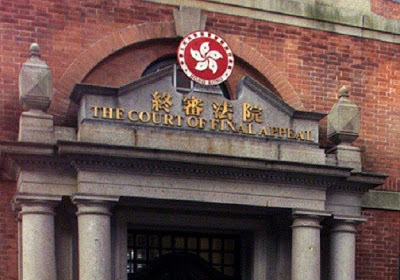 Appeals take time and money
Appeals take time and money
Wouldn’t order be restored if voters send those lawmakers back in the Legco in the by-elections to fill the vacate seats?
One of the biggest hurdles facing the ousted lawmakers is their eligibility to run for Legco again. In August 2016, the Returning Officers (選舉主任) – bureaucrats who have enormous power and discretion to decide whether an individual is eligible to run – banned several localist candidates from the Legco race on the basis that their declarations of allegiance to the SAR government were “insincere.” There is a high chance that the same political screening will be applied or even tightened in the upcoming by-election to prevent the ousted lawmakers from returning to Legco.
Moreover, any individual who has filed for bankruptcy or received a sentence of three months or more is subject to a five-year moratorium on a Legco run. Nathan Law and “Long Hair” Leung Kwok-hung, for instance, both face potentially stiff prison terms for their involvement in the occupy movement in 2014 as well as imminent bankruptcy for reasons explained earlier. That means the two will likely not be able to run again until 2024, a political eternity away.
Finally, the earliest that the by-elections can be held is this winter. Even if the unseated lawmakers somehow get over the above hurdles and win back their seats, they may be returning to a very different legislature. By then, the pro-establishment camp will have declawed the opposition by taking away the filibuster.
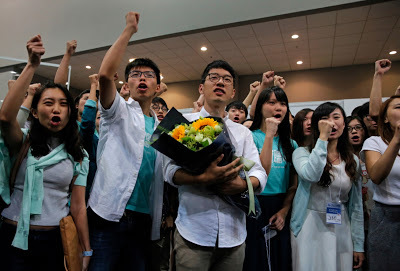 Nathan Law will try to get voted back in
Nathan Law will try to get voted back in
What can we do now? Are we doomed?
Things are expected to get much worse before they get better.
In the coming months, the High Court is expected to unseat two more lawmakers, Eddie Chu Hoi-dick (朱凱廸) and Cheng Chung-tai (鄭松泰), both of whom had embellished their oaths. The opposition will be mere seats away from losing the critical number in Legco to veto damaging amendments to the Basic Law. Once the pro-establishment camp secures a super-majority it has been salivating over for years to change the constitution as they see fit, the consequences can be catastrophic.
____________________________________
This article appeared on Hong Kong Free Press under the title "FAQ: How might the ejection of 4 more pro-democracy lawmakers alter Hong Kong’s political landscape?"
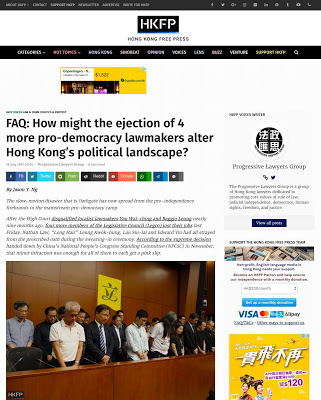 As posted on hongkongfp.com
As posted on hongkongfp.com
After the High Court disqualified localist lawmakers Yau Wai-ching (游蕙禎) and Baggio Leung Chung-hang (梁頌恆) nearly nine months ago, four more members of the Legislative Council (Legco) lost their jobs last Friday. Nathan Law Kwun-chung (羅冠聰), “Long Hair” Leung Kwok-hung (梁國雄), Lau Siu-lai (劉小麗) and Edward Yiu Chung-yim (姚松炎) had all strayed from the prescribed oath during the swearing-in ceremony. According to the supreme decision handed down by China’s National People’s Congress Standing Committee (NPCSC 人大常委會 ) in November, that minor infraction was enough for all of them to each get a pink slip.
If you are wondering how the loss of six seats has affected the balance of power in Hong Kong, you are not alone. The following FAQs are designed to answer that question and posit what is to come.
 They're fired
They're firedWalk me through the numbers before and after Oathgate?
There are a total of 70 seats in Legco, half of which are called “geographical constituencies” (GCs) and other half “functional constituencies” (FCs).
All 35 GCs are directly elected by a broad base of registered voters, which means GC lawmakers are mostly good folks who are accountable to their constituents. By contrast, most of the FCs (30 out of 35) are not democratically elected – they are handpicked by a small circle of committee members within a particular trade group, such as real estate, food and beverage, and retail. With the exception of a number of politically liberal groups like medical professionals, lawyers and social workers, the FC is stacked with pro-Beijing, pro-establishment businessmen who march in lockstep with the government.
Before Oathgate, the opposition held a total of 29 seats in Legco: 19 GCs and 10 FCs. Although the opposition was in the minority in Legco at large (29 out of 70) and within the FC (10 out of 35), they enjoyed a majority in the GC (19 out of 35). After losing six seats in two rounds of disqualification, the opposition is down to 23 seats: 14 GCs and 9 FCs. For the first time since the handover, they have lost their GC majority.
The following table summarises the impact of Oathgate to date:
Number of seats held by opposition Before Oathgate After Oathgate Geographical constituencies 19(majority) 14(minority) Functional constituencies 10(minority) 9(minority) Total 29(minority) 23(minority)
 Balance of power shifted
Balance of power shifted
T he opposition has never enjoyed a majority in Legco even before Oathgate. What difference does losing six seats make?
Under the Basic Law, any bill introduced by the government (except for those relating to constitutional issues such as electoral reform or any amendment to the Basic Law) requires a simple majority vote in Legco. With or without Oathgate, the pro-establishment camp has enough votes to rubber stamp any government-led initiatives, such as an anti-subversion bill under Article 23 of the Basic Law or a funding proposal for the high-speed rail link to Shenzhen.
The only thing standing between us and bad government bills is the filibuster (which thwarted C.Y. Leung’s attempt in 2012 to create new ministerial positions to, critics say, enrich his political friends) and public outcry (which forced Tung Chee-hwa 董建華 to withdraw the controversial anti-subversion bill in 2003).
While Oathgate has not affected the overall balance of power in Legco vis-à-vis government-proposed bills, it has tipped the balance by handing the GC majority to the pro-establishment camp.
 Protest against high-speed rail link
Protest against high-speed rail linkWhy does losing the GC majority matter?
The Basic Law contains a bizarre voting rule called the “separate vote count” (分組點票). Unlike government-proposed bills that require a simple majority vote by all 70 Legco seats voting together, any bill introduced by an individual lawmaker must go through two rounds of voting: it must first be passed by the GC before being separately voted on by the FC.
Oathgate has created an opening for the pro-establishment camp to wreak havoc by proposing dangerous bills. Without its GC majority, the opposition has lost the ability to defeat bad bills introduced by their opponents. Going forward, any proposal floated by a lawmaker from the dark side will sail through both the GC and FC during the separate vote count.
One of the first things that the pro-establishment camp will do with its new GC majority is propose an amendment to voting procedures – a motion that only a lawmaker on the Committee on Rules of Procedure can initiate. The goal is to put an end to the filibuster by, for instance, putting a cap on how long or how many times a Legco member can speak when debating a bill or enabling the chairman to cut short the session and proceed to a vote. With both the GC and FC now controlled by Beijing loyalists, there is nothing to stop that amendment from being passed and the opposition can kiss the filibuster goodbye.
The filibuster is currently the opposition’s only effective weapon to delay or derail bad government bills such as funding requests for infrastructure projects that squander billions of taxpayer dollars. Thanks to Oathgate, we stand to lose the only checks and balances against the government led by a chief executive whom we play no part in choosing.
 Albert Chan, one of the skilled filibusterers
Albert Chan, one of the skilled filibusterersDoes it mean the government can now pass an anti-subversion law without any resistance?
Remember, any bill introduced by the government, including the anti-subversion bill under Article 23 of the Basic Law, requires only a simple majority vote of all 70 LegCo members voting together. Since the pro-establishment has always enjoyed a majority in Legco at large, the opposition never has sufficient votes to block that bill from being passed whether or not they have those six seats.
As mentioned earlier, the only things stopping the pro-establishment camp from passing the much-dreaded bill are the filibuster – which is now in jeopardy – and public pressure. The latter remains an effective deterrence because the SAR government cannot afford a repeat of the political crisis that rattled the city in 2003.
 Epic July 1st march in 2003
Epic July 1st march in 2003Why don’t the disqualified lawmakers simply appeal the court rulings?
First, the chances that the High Court rulings will be reversed or set aside are slim. NPCSC decisions are meant to be the ultimate interpretation of the Basic Law and binding on all levels of local courts. As much as appellant court judges may be sympathetic to the opposition’s arguments, their hands are tied.
Second, appeals are costly. Already, the disqualified lawmakers owe millions in counsel and court fees, and because the annulment of their office is retroactive, they may be on the hook for millions more if the government goes after them for paid salaries and expense disbursements. For some of the ousted lawmakers, bankruptcy is the only way out.
Appeals are also time-consuming. It takes months, sometimes years, for a case to move through the court calendar. By the time a ruling is handed down, the pro-establishment will have already completed their handiwork and killed the filibuster by amending the Rules of Procedures using their new GC major.
 Appeals take time and money
Appeals take time and moneyWouldn’t order be restored if voters send those lawmakers back in the Legco in the by-elections to fill the vacate seats?
One of the biggest hurdles facing the ousted lawmakers is their eligibility to run for Legco again. In August 2016, the Returning Officers (選舉主任) – bureaucrats who have enormous power and discretion to decide whether an individual is eligible to run – banned several localist candidates from the Legco race on the basis that their declarations of allegiance to the SAR government were “insincere.” There is a high chance that the same political screening will be applied or even tightened in the upcoming by-election to prevent the ousted lawmakers from returning to Legco.
Moreover, any individual who has filed for bankruptcy or received a sentence of three months or more is subject to a five-year moratorium on a Legco run. Nathan Law and “Long Hair” Leung Kwok-hung, for instance, both face potentially stiff prison terms for their involvement in the occupy movement in 2014 as well as imminent bankruptcy for reasons explained earlier. That means the two will likely not be able to run again until 2024, a political eternity away.
Finally, the earliest that the by-elections can be held is this winter. Even if the unseated lawmakers somehow get over the above hurdles and win back their seats, they may be returning to a very different legislature. By then, the pro-establishment camp will have declawed the opposition by taking away the filibuster.
 Nathan Law will try to get voted back in
Nathan Law will try to get voted back inWhat can we do now? Are we doomed?
Things are expected to get much worse before they get better.
In the coming months, the High Court is expected to unseat two more lawmakers, Eddie Chu Hoi-dick (朱凱廸) and Cheng Chung-tai (鄭松泰), both of whom had embellished their oaths. The opposition will be mere seats away from losing the critical number in Legco to veto damaging amendments to the Basic Law. Once the pro-establishment camp secures a super-majority it has been salivating over for years to change the constitution as they see fit, the consequences can be catastrophic.
____________________________________
This article appeared on Hong Kong Free Press under the title "FAQ: How might the ejection of 4 more pro-democracy lawmakers alter Hong Kong’s political landscape?"
 As posted on hongkongfp.com
As posted on hongkongfp.com
Published on July 19, 2017 07:34
FAQ on 4DQ 四議員DQ常見問題
The slow-motion disaster that is Oathgate has now spread from the pro-independence firebrands to the mainstream pro-democracy camp.
After the High Court disqualified localist lawmakers Yau Wai-ching (游蕙禎) and Baggio Leung Chung-hang (梁頌恆) nearly nine months ago, four more members of the Legislative Council (Legco) lost their jobs last Friday. Nathan Law Kwun-chung (羅冠聰), “Long Hair” Leung Kwok-hung (梁國雄), Lau Siu-lai (劉小麗) and Edward Yiu Chung-yim (姚松炎) had all strayed from the prescribed oath during the swearing-in ceremony. According to the supreme decision handed down by China’s National People’s Congress Standing Committee (NPCSC 人大常委會 ) in November, that minor infraction was enough for all of them to each get a pink slip.
If you are wondering how the loss of six seats has affected the balance of power in Hong Kong, you are not alone. The following FAQs are designed to answer that question and posit what is to come.
 They're fired
They're fired
Walk me through the numbers before and after Oathgate?
There are a total of 70 seats in Legco, half of which are called “geographical constituencies” (GCs) and other half “functional constituencies” (FCs).
All 35 GCs are directly elected by a broad base of registered voters, which means GC lawmakers are mostly good folks who are accountable to their constituents. By contrast, most of the FCs (30 out of 35) are not democratically elected – they are handpicked by a small circle of committee members within a particular trade group, such as real estate, food and beverage, and retail. With the exception of a number of politically liberal groups like medical professionals, lawyers and social workers, the FC is stacked with pro-Beijing, pro-establishment businessmen who march in lockstep with the government.
Before Oathgate, the opposition held a total of 29 seats in Legco: 19 GCs and 10 FCs. Although the opposition was in the minority in Legco at large (29 out of 70) and within the FC (10 out of 35), they enjoyed a majority in the GC (19 out of 35). After losing six seats in two rounds of disqualification, the opposition is down to 23 seats: 14 GCs and 9 FCs. For the first time since the handover, they have lost their GC majority.
The following table summarises the impact of Oathgate to date:
Number of seats held by opposition Before Oathgate After Oathgate Geographical constituencies 19(majority) 14(minority) Functional constituencies 10(minority) 9(minority) Total 29(minority) 23(minority)
 Balance of power shifted
Balance of power shifted
T he opposition has never enjoyed a majority in Legco even before Oathgate. What difference does losing six seats make?
Under the Basic Law, any bill introduced by the government (except for those relating to constitutional issues such as electoral reform or any amendment to the Basic Law) requires a simple majority vote in Legco. With or without Oathgate, the pro-establishment camp has enough votes to rubber stamp any government-led initiatives, such as an anti-subversion bill under Article 23 of the Basic Law or a funding proposal for the high-speed rail link to Shenzhen.
The only thing standing between us and bad government bills is the filibuster (which thwarted C.Y. Leung’s attempt in 2012 to create new ministerial positions to, critics say, enrich his political friends) and public outcry (which forced Tung Chee-hwa 董建華 to withdraw the controversial anti-subversion bill in 2003).
While Oathgate has not affected the overall balance of power in Legco vis-à-vis government-proposed bills, it has tipped the balance by handing the GC majority to the pro-establishment camp.
 Protest against high-speed rail link
Protest against high-speed rail link
Why does losing the GC majority matter?
The Basic Law contains a bizarre voting rule called the “separate vote count” (分組點票). Unlike government-proposed bills that require a simple majority vote by all 70 Legco seats voting together, any bill introduced by an individual lawmaker must go through two rounds of voting: it must first be passed by the GC before being separately voted on by the FC.
Oathgate has created an opening for the pro-establishment camp to wreak havoc by proposing dangerous bills. Without its GC majority, the opposition has lost the ability to defeat bad bills introduced by their opponents. Going forward, any proposal floated by a lawmaker from the dark side will sail through both the GC and FC during the separate vote count.
One of the first things that the pro-establishment camp will do with its new GC majority is propose an amendment to voting procedures – a motion that only a lawmaker on the Committee on Rules of Procedure can initiate. The goal is to put an end to the filibuster by, for instance, putting a cap on how long or how many times a Legco member can speak when debating a bill or enabling the chairman to cut short the session and proceed to a vote. With both the GC and FC now controlled by Beijing loyalists, there is nothing to stop that amendment from being passed and the opposition can kiss the filibuster goodbye.
The filibuster is currently the opposition’s only effective weapon to delay or derail bad government bills such as funding requests for infrastructure projects that squander billions of taxpayer dollars. Thanks to Oathgate, we stand to lose the only checks and balances against the government led by a chief executive whom we play no part in choosing.
 Albert Chan, one of the skilled filibusterers
Albert Chan, one of the skilled filibusterers
Does it mean the government can now pass an anti-subversion law without any resistance?
Remember, any bill introduced by the government, including the anti-subversion bill under Article 23 of the Basic Law, requires only a simple majority vote of all 70 LegCo members voting together. Since the pro-establishment has always enjoyed a majority in Legco at large, the opposition never has sufficient votes to block that bill from being passed whether or not they have those six seats.
As mentioned earlier, the only things stopping the pro-establishment camp from passing the much-dreaded bill are the filibuster – which is now in jeopardy – and public pressure. The latter remains an effective deterrence because the SAR government cannot afford a repeat of the political crisis that rattled the city in 2003.
 Epic July 1st march in 2003
Epic July 1st march in 2003
Why don’t the disqualified lawmakers simply appeal the court rulings?
First, the chances that the High Court rulings will be reversed or set aside are slim. NPCSC decisions are meant to be the ultimate interpretation of the Basic Law and binding on all levels of local courts. As much as appellant court judges may be sympathetic to the opposition’s arguments, their hands are tied.
Second, appeals are costly. Already, the disqualified lawmakers owe millions in counsel and court fees, and because the annulment of their office is retroactive, they may be on the hook for millions more if the government goes after them for paid salaries and expense disbursements. For some of the ousted lawmakers, bankruptcy is the only way out.
Appeals are also time-consuming. It takes months, sometimes years, for a case to move through the court calendar. By the time a ruling is handed down, the pro-establishment will have already completed their handiwork and killed the filibuster by amending the Rules of Procedures using their new GC major.
 Appeals take time and money
Appeals take time and money
Wouldn’t order be restored if voters send those lawmakers back in the Legco in the by-elections to fill the vacate seats?
One of the biggest hurdles facing the ousted lawmakers is their eligibility to run for Legco again. In August 2016, the Returning Officers (選舉主任) – bureaucrats who have enormous power and discretion to decide whether an individual is eligible to run – banned several localist candidates from the Legco race on the basis that their declarations of allegiance to the SAR government were “insincere.” There is a high chance that the same political screening will be applied or even tightened in the upcoming by-election to prevent the ousted lawmakers from returning to Legco.
Moreover, any individual who has filed for bankruptcy or received a sentence of three months or more is subject to a five-year moratorium on a Legco run. Nathan Law and “Long Hair” Leung Kwok-hung, for instance, both face potentially stiff prison terms for their involvement in the occupy movement in 2014 as well as imminent bankruptcy for reasons explained earlier. That means the two will likely not be able to run again until 2024, a political eternity away.
Finally, the earliest that the by-elections can be held is this winter. Even if the unseated lawmakers somehow get over the above hurdles and win back their seats, they may be returning to a very different legislature. By then, the pro-establishment camp will have declawed the opposition by taking away the filibuster.
 Nathan Law will try to get voted back in
Nathan Law will try to get voted back in
What can we do now? Are we doomed?
Things are expected to get much worse before they get better.
In the coming months, the High Court is expected to unseat two more lawmakers, Eddie Chu Hoi-dick (朱凱廸) and Cheng Chung-tai (鄭松泰), both of whom had embellished their oaths. The opposition will be mere seats away from losing the critical number in Legco to veto damaging amendments to the Basic Law. Once the pro-establishment camp secures a super-majority it has been salivating over for years to change the constitution as they see fit, the consequences can be catastrophic.
____________________________________
This article appeared on Hong Kong Free Press under the title "FAQ: How might the ejection of 4 more pro-democracy lawmakers alter Hong Kong’s political landscape?"
 As posted on hongkongfp.com
As posted on hongkongfp.com
After the High Court disqualified localist lawmakers Yau Wai-ching (游蕙禎) and Baggio Leung Chung-hang (梁頌恆) nearly nine months ago, four more members of the Legislative Council (Legco) lost their jobs last Friday. Nathan Law Kwun-chung (羅冠聰), “Long Hair” Leung Kwok-hung (梁國雄), Lau Siu-lai (劉小麗) and Edward Yiu Chung-yim (姚松炎) had all strayed from the prescribed oath during the swearing-in ceremony. According to the supreme decision handed down by China’s National People’s Congress Standing Committee (NPCSC 人大常委會 ) in November, that minor infraction was enough for all of them to each get a pink slip.
If you are wondering how the loss of six seats has affected the balance of power in Hong Kong, you are not alone. The following FAQs are designed to answer that question and posit what is to come.
 They're fired
They're firedWalk me through the numbers before and after Oathgate?
There are a total of 70 seats in Legco, half of which are called “geographical constituencies” (GCs) and other half “functional constituencies” (FCs).
All 35 GCs are directly elected by a broad base of registered voters, which means GC lawmakers are mostly good folks who are accountable to their constituents. By contrast, most of the FCs (30 out of 35) are not democratically elected – they are handpicked by a small circle of committee members within a particular trade group, such as real estate, food and beverage, and retail. With the exception of a number of politically liberal groups like medical professionals, lawyers and social workers, the FC is stacked with pro-Beijing, pro-establishment businessmen who march in lockstep with the government.
Before Oathgate, the opposition held a total of 29 seats in Legco: 19 GCs and 10 FCs. Although the opposition was in the minority in Legco at large (29 out of 70) and within the FC (10 out of 35), they enjoyed a majority in the GC (19 out of 35). After losing six seats in two rounds of disqualification, the opposition is down to 23 seats: 14 GCs and 9 FCs. For the first time since the handover, they have lost their GC majority.
The following table summarises the impact of Oathgate to date:
Number of seats held by opposition Before Oathgate After Oathgate Geographical constituencies 19(majority) 14(minority) Functional constituencies 10(minority) 9(minority) Total 29(minority) 23(minority)
 Balance of power shifted
Balance of power shifted
T he opposition has never enjoyed a majority in Legco even before Oathgate. What difference does losing six seats make?
Under the Basic Law, any bill introduced by the government (except for those relating to constitutional issues such as electoral reform or any amendment to the Basic Law) requires a simple majority vote in Legco. With or without Oathgate, the pro-establishment camp has enough votes to rubber stamp any government-led initiatives, such as an anti-subversion bill under Article 23 of the Basic Law or a funding proposal for the high-speed rail link to Shenzhen.
The only thing standing between us and bad government bills is the filibuster (which thwarted C.Y. Leung’s attempt in 2012 to create new ministerial positions to, critics say, enrich his political friends) and public outcry (which forced Tung Chee-hwa 董建華 to withdraw the controversial anti-subversion bill in 2003).
While Oathgate has not affected the overall balance of power in Legco vis-à-vis government-proposed bills, it has tipped the balance by handing the GC majority to the pro-establishment camp.
 Protest against high-speed rail link
Protest against high-speed rail linkWhy does losing the GC majority matter?
The Basic Law contains a bizarre voting rule called the “separate vote count” (分組點票). Unlike government-proposed bills that require a simple majority vote by all 70 Legco seats voting together, any bill introduced by an individual lawmaker must go through two rounds of voting: it must first be passed by the GC before being separately voted on by the FC.
Oathgate has created an opening for the pro-establishment camp to wreak havoc by proposing dangerous bills. Without its GC majority, the opposition has lost the ability to defeat bad bills introduced by their opponents. Going forward, any proposal floated by a lawmaker from the dark side will sail through both the GC and FC during the separate vote count.
One of the first things that the pro-establishment camp will do with its new GC majority is propose an amendment to voting procedures – a motion that only a lawmaker on the Committee on Rules of Procedure can initiate. The goal is to put an end to the filibuster by, for instance, putting a cap on how long or how many times a Legco member can speak when debating a bill or enabling the chairman to cut short the session and proceed to a vote. With both the GC and FC now controlled by Beijing loyalists, there is nothing to stop that amendment from being passed and the opposition can kiss the filibuster goodbye.
The filibuster is currently the opposition’s only effective weapon to delay or derail bad government bills such as funding requests for infrastructure projects that squander billions of taxpayer dollars. Thanks to Oathgate, we stand to lose the only checks and balances against the government led by a chief executive whom we play no part in choosing.
 Albert Chan, one of the skilled filibusterers
Albert Chan, one of the skilled filibusterersDoes it mean the government can now pass an anti-subversion law without any resistance?
Remember, any bill introduced by the government, including the anti-subversion bill under Article 23 of the Basic Law, requires only a simple majority vote of all 70 LegCo members voting together. Since the pro-establishment has always enjoyed a majority in Legco at large, the opposition never has sufficient votes to block that bill from being passed whether or not they have those six seats.
As mentioned earlier, the only things stopping the pro-establishment camp from passing the much-dreaded bill are the filibuster – which is now in jeopardy – and public pressure. The latter remains an effective deterrence because the SAR government cannot afford a repeat of the political crisis that rattled the city in 2003.
 Epic July 1st march in 2003
Epic July 1st march in 2003Why don’t the disqualified lawmakers simply appeal the court rulings?
First, the chances that the High Court rulings will be reversed or set aside are slim. NPCSC decisions are meant to be the ultimate interpretation of the Basic Law and binding on all levels of local courts. As much as appellant court judges may be sympathetic to the opposition’s arguments, their hands are tied.
Second, appeals are costly. Already, the disqualified lawmakers owe millions in counsel and court fees, and because the annulment of their office is retroactive, they may be on the hook for millions more if the government goes after them for paid salaries and expense disbursements. For some of the ousted lawmakers, bankruptcy is the only way out.
Appeals are also time-consuming. It takes months, sometimes years, for a case to move through the court calendar. By the time a ruling is handed down, the pro-establishment will have already completed their handiwork and killed the filibuster by amending the Rules of Procedures using their new GC major.
 Appeals take time and money
Appeals take time and moneyWouldn’t order be restored if voters send those lawmakers back in the Legco in the by-elections to fill the vacate seats?
One of the biggest hurdles facing the ousted lawmakers is their eligibility to run for Legco again. In August 2016, the Returning Officers (選舉主任) – bureaucrats who have enormous power and discretion to decide whether an individual is eligible to run – banned several localist candidates from the Legco race on the basis that their declarations of allegiance to the SAR government were “insincere.” There is a high chance that the same political screening will be applied or even tightened in the upcoming by-election to prevent the ousted lawmakers from returning to Legco.
Moreover, any individual who has filed for bankruptcy or received a sentence of three months or more is subject to a five-year moratorium on a Legco run. Nathan Law and “Long Hair” Leung Kwok-hung, for instance, both face potentially stiff prison terms for their involvement in the occupy movement in 2014 as well as imminent bankruptcy for reasons explained earlier. That means the two will likely not be able to run again until 2024, a political eternity away.
Finally, the earliest that the by-elections can be held is this winter. Even if the unseated lawmakers somehow get over the above hurdles and win back their seats, they may be returning to a very different legislature. By then, the pro-establishment camp will have declawed the opposition by taking away the filibuster.
 Nathan Law will try to get voted back in
Nathan Law will try to get voted back inWhat can we do now? Are we doomed?
Things are expected to get much worse before they get better.
In the coming months, the High Court is expected to unseat two more lawmakers, Eddie Chu Hoi-dick (朱凱廸) and Cheng Chung-tai (鄭松泰), both of whom had embellished their oaths. The opposition will be mere seats away from losing the critical number in Legco to veto damaging amendments to the Basic Law. Once the pro-establishment camp secures a super-majority it has been salivating over for years to change the constitution as they see fit, the consequences can be catastrophic.
____________________________________
This article appeared on Hong Kong Free Press under the title "FAQ: How might the ejection of 4 more pro-democracy lawmakers alter Hong Kong’s political landscape?"
 As posted on hongkongfp.com
As posted on hongkongfp.com
Published on July 19, 2017 07:34
July 17, 2017
Going Too Far 官逼民反
On Thursday evening, Chinese dissident and political prisoner Liu Xiaobo died from liver cancer in a Shenyang Hospital. Liu was, as the Western press sharply pointed out, the first Nobel Peace Prize laureate to die in custody since Carl von Ossietzky did in Nazi Germany in 1938. Supporters the world over mourned the death of a man who lived and died a hero. The only crime he ever committed was penning a proposal that maps out a bloodless path for his country to democratise.
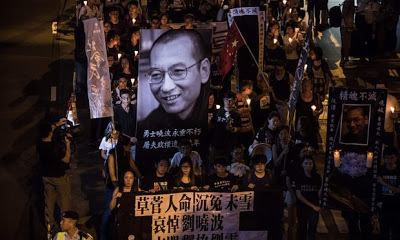 Liu lived and died a hero
Liu lived and died a hero
Then on Friday afternoon, Beijing’s long arm stretched across the border and reached into Hong Kong’s courtroom. Bound by the National People’s Congress Standing Committee’s decision on oath-taking etiquettes, the Hong Kong High Court ruled to unseat four democratically-elected opposition lawmakers, including Nathan Law, the youngest person ever to be elected to the legislature. The only infraction the four ever committed was straying from their oaths during the swearing-in ceremony to voice their desire for their city to democratise.
The two news stories, less than 24 hours apart, share a chilling symmetry. They underscore the Chinese government’s growing intolerance for dissent on both the mainland and the territories it controls.
Read the rest of this article on TheGuardian.com.
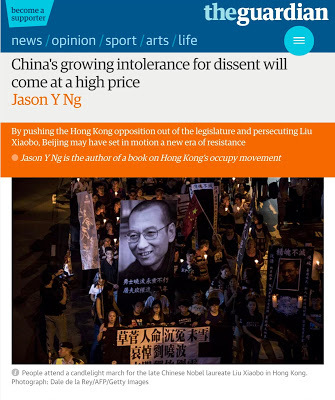 As the article appeared in The Guardian
As the article appeared in The Guardian
 Liu lived and died a hero
Liu lived and died a heroThen on Friday afternoon, Beijing’s long arm stretched across the border and reached into Hong Kong’s courtroom. Bound by the National People’s Congress Standing Committee’s decision on oath-taking etiquettes, the Hong Kong High Court ruled to unseat four democratically-elected opposition lawmakers, including Nathan Law, the youngest person ever to be elected to the legislature. The only infraction the four ever committed was straying from their oaths during the swearing-in ceremony to voice their desire for their city to democratise.
The two news stories, less than 24 hours apart, share a chilling symmetry. They underscore the Chinese government’s growing intolerance for dissent on both the mainland and the territories it controls.
Read the rest of this article on TheGuardian.com.
 As the article appeared in The Guardian
As the article appeared in The Guardian
Published on July 17, 2017 09:42
July 9, 2017
Trials of the Fourth Estate–Special Double Issue 第四權之考驗-特別雙刊
An independent press is called the fourth estate because it holds accountable the ruling class—from the clergy and the noblemen in medieval times to the three branches of government in modern democracies.
In Hong Kong, the press plays an especially critical role because citizens are deprived of a democratically elected government. Both the chief executive and nearly half the legislature are appointed by small committees stacked with pro-Beijing loyalists, which gives ordinary people little leverage over politicians they play no part in choosing. Going to the press is often the most effective, if not the only, recourse available to those who want their grievances heard or injustices righted,
Article 27 of the Basic Law protects freedom of the press, as does the Bill of Rights Ordinance which guarantees broad rights to “impart information and ideas.” While the letter of the law is clear, the reality in which journalists operate tells a different story.
Since the handover, Hong Kong’s ranking on the World Press Freedom Index has been in freefall, slipping from 18th in 2002 to 73rd in 2017 and lagging behind countries such as Haiti, Bosnia and El Salvador.
Has the city’s free press become the first casualty in the “one country, two systems” experiment?
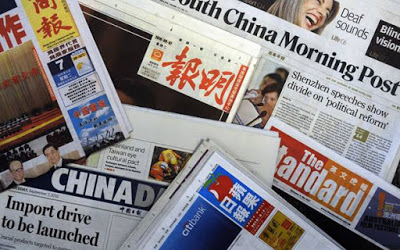 Last papers standing
Last papers standing
Overt suppression
In Hong Kong, direct encroachment on press freedom can take many forms. The Apple Daily, the only broadsheet newspaper that remains openly critical of Beijing, bears the brunt of the onslaught.
During and since the Umbrella Movement, the paper has come under repeated cyber-attacks, its parent company Next Media has had its headquarters firebombed, and its outspoken founder Jimmy Lai (黎智英) has been harassed.
But Apple Daily is hardly alone and its woes are merely the tip of the iceberg.
First, there is outright censorship. Since 2015, online-only news media outlets such as Hong Kong Free Press, Initium (端傳媒) and Stand News (立場新聞) have been barred from attending government press conferences. Just last week, the government’s Information Services Department extended the ban to official events related to the 20th anniversary of the handover.
“Online media make bureaucrats nervous because they are hard to control,” says Lau Sai-leung (劉細良), a former government information coordinator and co-founder of House News(主場新聞), the predecessor of Stand News.
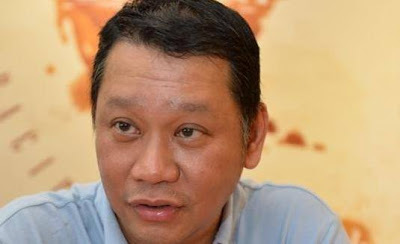 Lai Sai-leung, Stand News columnist
Lai Sai-leung, Stand News columnist
“Unlike most traditional print media outlets which are owned by big businesses, online outlets are independently owned.” Lau tells me. “They are targeted because they aren’t part of the unholy alliance between the government and the establishment.”
Defamation suits are another effective tool to silence the independent press. On at least three occasions between 2013 and 2016, chief executive C.Y. Leung threatened litigation against Hong Kong Economic Journal (HKEJ 信報) and Apple Daily for reporting his alleged ties with Triads, abuse of power and undeclared business dealings.
“Leung’s threats bear the hallmarks of the intimidation tactics in Singapore, where senior government officials are known to use legal action to inhibit dissent,” William Nee, a Hong Kong-based researcher at Amnesty International, tells me.
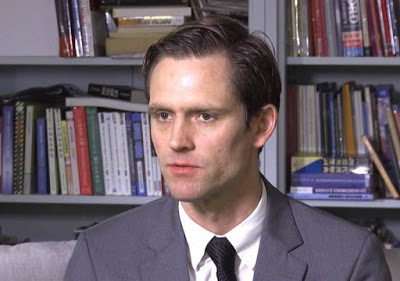 William Nee, researcher at Amnesty International
William Nee, researcher at Amnesty International
If all things fail, however, adversaries resort to the blunt instrument of physical violence. The Hong Kong Journalists Association documented a significant surge in the number of cases of attacks on frontline reporters during and since the Umbrella Movement by pro-Beijing groups and, in some instances, law enforcement.
Among the long list of documented physical assaults committed against journalists, the most egregious one occurred in 2014 when Kevin Lau Chun-to (劉進圖), the former editor-in-chief of Ming Pao(明報), was stabbed six times in broad daylightoutside a restaurant. The news sent shock waves across the media industry and remains one of the most frequently cited incidents of violence against journalists in the region.
Lau and his colleagues spent weeks after the attack sifting through hundreds of news reports he had worked on, trying to identify individuals or organizations he might have upset. It was a sobering exercise for him and his staff.
“The chilling effect on investigative journalism and the news media at large is immediate and far-reaching,” said Lau. “A student came up to me after a public event recently,” he recalled, “and told me her parents had been talking her out of majoring in journalism at university because they think that line of work is no longer safe. That broke my heart.”
When asked whether the knife attack was an isolated incident or part of a worrying trend, Lau said, “A single attack is one too many. The uncertainty of not knowing when the next strike will happen or what may trigger it is enough deterrence to journalists.”
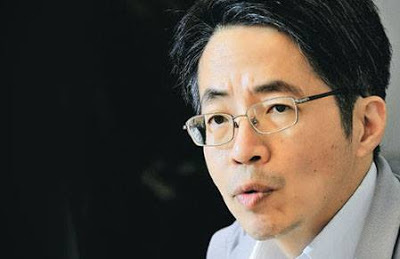 Kevin Lau, former editor-in-chief of Ming Pao
Kevin Lau, former editor-in-chief of Ming Pao
Indirect pressure
The post-handover era has witnessed a series of ownership changes in the media industry. In 2001, pro-Beijing businessman and CPPCC (政協) member Charles Ho Tsu-kwok (何柱國) took over the Sing Tao Daily (星島日報) and The Standard. Five years later, HKEJ was sold to Richard Li Tzar-kai (李澤楷) of telecom giant PCCW and younger son of tycoon Li Ka-shing (李嘉誠). In 2015, Jack Ma’s Alibaba bought the South China Morning Post (SCMP) and other media assets for HK$2 billion.
“China has been mobilizing the local business elite and making them do much of its dirty work,” Chip Tsao (陶傑), columnist, radio host and opinion leader, told me last month. “Beijing bedazzles them with economic possibilities in the new China and asks for their ‘understanding’ and ‘cooperation’ when implementing its political agenda in Hong Kong. It is part of the ‘United Front’ (統戰) campaign that began long before the handover.”
According to Tsao, United Front is a series of coordinated efforts orchestrated by the Communist Party and carried out by the Liaison Office—the de facto Chinese consulate in Hong Kong—to tighten control on the city, most notably by recruiting prominent business leaders in Hong Kong and op-opting them as CPPCC members or unofficial advisers to the central government.
“Buying up newspapers and making senior editors pull their punches when covering the mainland are all part of that scheme. Once Beijing has these local businessmen on a leash, self-censorship is just a phone call away,” Chip explained. He used that to explain controversial editorial decisions such as the one reportedly made by SCMP to reduce and bury its report on the alleged suicide of mainland activist Li Wangyang (李旺陽).
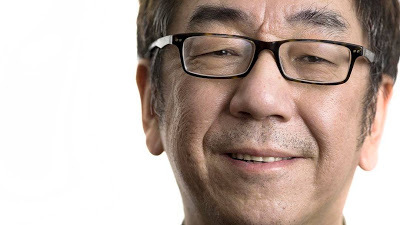 Chip Tsao, opinion leader
Chip Tsao, opinion leader
Other than editorial decisions, self-censorship can also take the form of personnel changes, including management reshuffling in the newsroom and discontinuation of influential columns.
In 2012, CPPCC member Wang Xiangwei (王向偉) was made SCMP’s editor-in-chief after top management discussed Wang’s appointment with the Liaison Office, according to Asia Sentinel. In 2014, Ming Pao replaced its chief editor Kevin Lau Chun-to with a more Beijing-friendly candidate from Malaysia. Two years later, the paper removed its executive chief editor Keung Kwok-yuen (姜國元) on the same day that an investigative report on the Panama Papers – one that would implicate the Beijing leadership – was to be published.
In 2015, SCMP terminated a number of outspoken columnists including Philip Bowring and Frank Ching. In the following year, HKEJ fired Joseph Lian Yi-zheng (練乙錚), a no-holds-barred columnist on mainland and cross-border issues.
Whatever the motive behind these decisions, they resulted in the dual consequence of removing critical voices and perhaps sending a message to the rest of the staff that they need to fall into line.
Just as media companies are pressured to self-discipline and in some cases self-mutilate, so are advertisers who want to stay on Beijing’s good side. “China is the world’s fastest growing market, and big businesses naturally think it wise to avoid placing ads in publications that are deemed ‘unfriendly’ to Beijing,” says Dorothy Wong (黃潔瑩), a seasoned marketing executive in the media industry.
Self-censorship by local corporations, such as banks and property developers, can have a devastating impact on traditional news media outlets that rely heavily on advertising revenue. For multinationals and international labels, much of the self-censorship is done by the advertising agencies.
“The Chanels and the Guccis of the world rely on local advertising agencies to advise them on local culture and faux pas,” Wong tells me. “These agencies will always err on the side of caution. If they already have a tight budget to work with and a large number of publications to choose from, why would anyone stick their neck out and make recommendations that could ruffle feathers for them or their clients?”
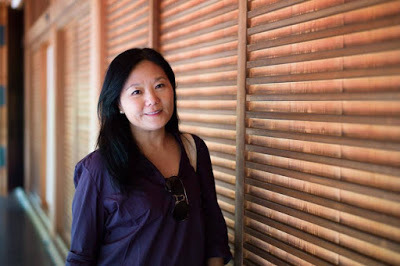 Dorothy Wong, media marketing executive
Dorothy Wong, media marketing executive
Industry disrupted
All of the foregoing come at a time when the press media is already under tremendous financial stress. Social media has fundamentally changed the way the world receives and disseminates information, and the ability for traditional news media to retain readership is now a matter of survival.
Whereas pro-Beijing media outlets are either run by deep-pocketed businesses or bankrolled by the Liaison Office, those that refuse to play ball with Beijing will need to find inventive ways to sell more papers to stay afloat.
The Apple Daily, for instance, does so by going the way of the Daily Mail and blurring the line between information and entertainment. In addition to giving generous coverage to celebrity gossip, it frequently pushes the boundaries of professional ethics. In 2000, an Apple Daily reporter was convicted for bribing police officers to obtain information about active criminal investigations. In 2016, the paper was ordered to pay BaWang Shampoo (霸王洗髮液) HK$3 million in damages for making unsubstantiated statements about the safety of BaWang’s products.
Apple Daily’s “supermarket tabloid” business model has called into question the paper’s credibility. Moreover, it reinforces the perception that, for a news media outlet to survive in Hong Kong, it either needs to go red or go over the top—neither approach does much to close the industry’s image gap.
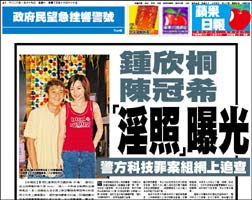 Typical Apple Daily front page
Typical Apple Daily front page
“The media industry has an identity crisis. It seems to have lost its way in the age of Facebook and Instagram,” said Wong. “No wonder circulation is way down. In the hey day, newspapers used to sell tens of thousands of copies every day. Now we are talking about hundreds, sometimes dozens. Circulation is so low that we have stopped using that word,” she said. “We talk about ‘readership’ instead because those numbers are less scientific and more easily fudged.”
The tough business environment has created a vicious circle that makes the industry more vulnerable to direct and indirect clampdown on press freedom, which in turn affects the quality of reporting and hurts readership.
“Political pressure has always existed—it existed long before the handover,” said Kevin Lau Chun-to. “The difference between now and then is that in the 1980s and 1990s, the media industry was much more robust than it is today. Back then, if the authorities managed to dissuade one newspaper from publishing an unfavorable story, other papers would step up. And if one advertiser decided to drop a newspaper, other companies would fill the spot. The industry was in a much better position to withstand political pressure. Since the handover, however, the balance of power has completely shifted in the authorities’ favor.”
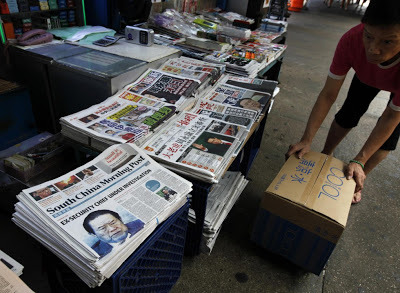 Circulation numbers are way down
Circulation numbers are way down
When one rooster dies, another crows
From direct suppression and self-censorship to the media industry’s own existential crisis, the walls are closing in on the city’s fourth estate. While these issues are not unique to Hong Kong, their impact is magnified by China’s new economic might and its ability to marshal the local business elite. What’s more, the looming threat of an anti-subversion law continues to hang over the head of every journalist like the Sword of Damocles.
But all is not lost. The rapid growth of online media outlets in Hong Kong, spurred in part by the Umbrella Movement and the political awakening it engendered, offers a glimmer of hope.
“There is a common perception that Hong Kong’s news media is doomed, but it is only a perception,” Johnny Lau Yui-siu (劉銳紹), veteran commentator and China relations expert, tells me. “I believe the industry is merely going through an evolutionary cycle. Traditional media is shrinking, but it has opened doors to new players. As the Cantonese saying goes: ‘when one rooster dies, another crows.’”
He pointed to the proliferation of online-only news sites, Facebook pages, podcast and YouTube channels. “Many of the newcomers are extremely successful in attracting clicks and eyeballs,” said Lau. “Their influence on public discourse, especially among young people, is growing exponentially. This is happening even when economic and political odds are stacked against them. I find that very encouraging.”
When asked how much longer independent media outlets, regardless of their format, can stand up to the crushing political pressure from Beijing, Lau was positively defiant. “We need to press ahead despite—and because of—the tremendous challenges facing us. All we need to do to look at what is going on north of the border—journalists on the mainland put their lives in grave danger every day. We need to work all the harder to defend the freedom we have and make the best of it while it is still there.”
“I’m not overly optimistic about what will happen in the short term, but I refuse to be overly pessimistic about the long term,” said Lau.
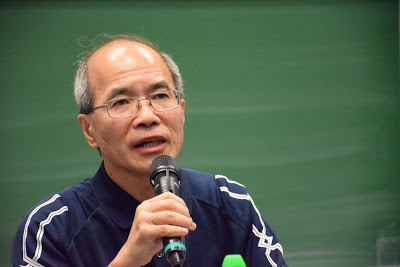 Johnny Lau, political commentator
Johnny Lau, political commentator
____________________________________
This article appeared on Hong Kong Free Press under the title “ HK20: Hong Kong’s fourth estate at stake – Trials of the city’s free press ."
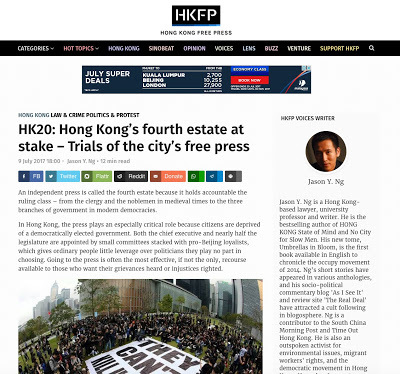 As posted on HKFP.com
As posted on HKFP.com
In Hong Kong, the press plays an especially critical role because citizens are deprived of a democratically elected government. Both the chief executive and nearly half the legislature are appointed by small committees stacked with pro-Beijing loyalists, which gives ordinary people little leverage over politicians they play no part in choosing. Going to the press is often the most effective, if not the only, recourse available to those who want their grievances heard or injustices righted,
Article 27 of the Basic Law protects freedom of the press, as does the Bill of Rights Ordinance which guarantees broad rights to “impart information and ideas.” While the letter of the law is clear, the reality in which journalists operate tells a different story.
Since the handover, Hong Kong’s ranking on the World Press Freedom Index has been in freefall, slipping from 18th in 2002 to 73rd in 2017 and lagging behind countries such as Haiti, Bosnia and El Salvador.
Has the city’s free press become the first casualty in the “one country, two systems” experiment?
 Last papers standing
Last papers standing
Overt suppression
In Hong Kong, direct encroachment on press freedom can take many forms. The Apple Daily, the only broadsheet newspaper that remains openly critical of Beijing, bears the brunt of the onslaught.
During and since the Umbrella Movement, the paper has come under repeated cyber-attacks, its parent company Next Media has had its headquarters firebombed, and its outspoken founder Jimmy Lai (黎智英) has been harassed.
But Apple Daily is hardly alone and its woes are merely the tip of the iceberg.
First, there is outright censorship. Since 2015, online-only news media outlets such as Hong Kong Free Press, Initium (端傳媒) and Stand News (立場新聞) have been barred from attending government press conferences. Just last week, the government’s Information Services Department extended the ban to official events related to the 20th anniversary of the handover.
“Online media make bureaucrats nervous because they are hard to control,” says Lau Sai-leung (劉細良), a former government information coordinator and co-founder of House News(主場新聞), the predecessor of Stand News.
 Lai Sai-leung, Stand News columnist
Lai Sai-leung, Stand News columnist“Unlike most traditional print media outlets which are owned by big businesses, online outlets are independently owned.” Lau tells me. “They are targeted because they aren’t part of the unholy alliance between the government and the establishment.”
Defamation suits are another effective tool to silence the independent press. On at least three occasions between 2013 and 2016, chief executive C.Y. Leung threatened litigation against Hong Kong Economic Journal (HKEJ 信報) and Apple Daily for reporting his alleged ties with Triads, abuse of power and undeclared business dealings.
“Leung’s threats bear the hallmarks of the intimidation tactics in Singapore, where senior government officials are known to use legal action to inhibit dissent,” William Nee, a Hong Kong-based researcher at Amnesty International, tells me.
 William Nee, researcher at Amnesty International
William Nee, researcher at Amnesty InternationalIf all things fail, however, adversaries resort to the blunt instrument of physical violence. The Hong Kong Journalists Association documented a significant surge in the number of cases of attacks on frontline reporters during and since the Umbrella Movement by pro-Beijing groups and, in some instances, law enforcement.
Among the long list of documented physical assaults committed against journalists, the most egregious one occurred in 2014 when Kevin Lau Chun-to (劉進圖), the former editor-in-chief of Ming Pao(明報), was stabbed six times in broad daylightoutside a restaurant. The news sent shock waves across the media industry and remains one of the most frequently cited incidents of violence against journalists in the region.
Lau and his colleagues spent weeks after the attack sifting through hundreds of news reports he had worked on, trying to identify individuals or organizations he might have upset. It was a sobering exercise for him and his staff.
“The chilling effect on investigative journalism and the news media at large is immediate and far-reaching,” said Lau. “A student came up to me after a public event recently,” he recalled, “and told me her parents had been talking her out of majoring in journalism at university because they think that line of work is no longer safe. That broke my heart.”
When asked whether the knife attack was an isolated incident or part of a worrying trend, Lau said, “A single attack is one too many. The uncertainty of not knowing when the next strike will happen or what may trigger it is enough deterrence to journalists.”
 Kevin Lau, former editor-in-chief of Ming Pao
Kevin Lau, former editor-in-chief of Ming PaoIndirect pressure
The post-handover era has witnessed a series of ownership changes in the media industry. In 2001, pro-Beijing businessman and CPPCC (政協) member Charles Ho Tsu-kwok (何柱國) took over the Sing Tao Daily (星島日報) and The Standard. Five years later, HKEJ was sold to Richard Li Tzar-kai (李澤楷) of telecom giant PCCW and younger son of tycoon Li Ka-shing (李嘉誠). In 2015, Jack Ma’s Alibaba bought the South China Morning Post (SCMP) and other media assets for HK$2 billion.
“China has been mobilizing the local business elite and making them do much of its dirty work,” Chip Tsao (陶傑), columnist, radio host and opinion leader, told me last month. “Beijing bedazzles them with economic possibilities in the new China and asks for their ‘understanding’ and ‘cooperation’ when implementing its political agenda in Hong Kong. It is part of the ‘United Front’ (統戰) campaign that began long before the handover.”
According to Tsao, United Front is a series of coordinated efforts orchestrated by the Communist Party and carried out by the Liaison Office—the de facto Chinese consulate in Hong Kong—to tighten control on the city, most notably by recruiting prominent business leaders in Hong Kong and op-opting them as CPPCC members or unofficial advisers to the central government.
“Buying up newspapers and making senior editors pull their punches when covering the mainland are all part of that scheme. Once Beijing has these local businessmen on a leash, self-censorship is just a phone call away,” Chip explained. He used that to explain controversial editorial decisions such as the one reportedly made by SCMP to reduce and bury its report on the alleged suicide of mainland activist Li Wangyang (李旺陽).
 Chip Tsao, opinion leader
Chip Tsao, opinion leaderOther than editorial decisions, self-censorship can also take the form of personnel changes, including management reshuffling in the newsroom and discontinuation of influential columns.
In 2012, CPPCC member Wang Xiangwei (王向偉) was made SCMP’s editor-in-chief after top management discussed Wang’s appointment with the Liaison Office, according to Asia Sentinel. In 2014, Ming Pao replaced its chief editor Kevin Lau Chun-to with a more Beijing-friendly candidate from Malaysia. Two years later, the paper removed its executive chief editor Keung Kwok-yuen (姜國元) on the same day that an investigative report on the Panama Papers – one that would implicate the Beijing leadership – was to be published.
In 2015, SCMP terminated a number of outspoken columnists including Philip Bowring and Frank Ching. In the following year, HKEJ fired Joseph Lian Yi-zheng (練乙錚), a no-holds-barred columnist on mainland and cross-border issues.
Whatever the motive behind these decisions, they resulted in the dual consequence of removing critical voices and perhaps sending a message to the rest of the staff that they need to fall into line.
Just as media companies are pressured to self-discipline and in some cases self-mutilate, so are advertisers who want to stay on Beijing’s good side. “China is the world’s fastest growing market, and big businesses naturally think it wise to avoid placing ads in publications that are deemed ‘unfriendly’ to Beijing,” says Dorothy Wong (黃潔瑩), a seasoned marketing executive in the media industry.
Self-censorship by local corporations, such as banks and property developers, can have a devastating impact on traditional news media outlets that rely heavily on advertising revenue. For multinationals and international labels, much of the self-censorship is done by the advertising agencies.
“The Chanels and the Guccis of the world rely on local advertising agencies to advise them on local culture and faux pas,” Wong tells me. “These agencies will always err on the side of caution. If they already have a tight budget to work with and a large number of publications to choose from, why would anyone stick their neck out and make recommendations that could ruffle feathers for them or their clients?”
 Dorothy Wong, media marketing executive
Dorothy Wong, media marketing executiveIndustry disrupted
All of the foregoing come at a time when the press media is already under tremendous financial stress. Social media has fundamentally changed the way the world receives and disseminates information, and the ability for traditional news media to retain readership is now a matter of survival.
Whereas pro-Beijing media outlets are either run by deep-pocketed businesses or bankrolled by the Liaison Office, those that refuse to play ball with Beijing will need to find inventive ways to sell more papers to stay afloat.
The Apple Daily, for instance, does so by going the way of the Daily Mail and blurring the line between information and entertainment. In addition to giving generous coverage to celebrity gossip, it frequently pushes the boundaries of professional ethics. In 2000, an Apple Daily reporter was convicted for bribing police officers to obtain information about active criminal investigations. In 2016, the paper was ordered to pay BaWang Shampoo (霸王洗髮液) HK$3 million in damages for making unsubstantiated statements about the safety of BaWang’s products.
Apple Daily’s “supermarket tabloid” business model has called into question the paper’s credibility. Moreover, it reinforces the perception that, for a news media outlet to survive in Hong Kong, it either needs to go red or go over the top—neither approach does much to close the industry’s image gap.
 Typical Apple Daily front page
Typical Apple Daily front page“The media industry has an identity crisis. It seems to have lost its way in the age of Facebook and Instagram,” said Wong. “No wonder circulation is way down. In the hey day, newspapers used to sell tens of thousands of copies every day. Now we are talking about hundreds, sometimes dozens. Circulation is so low that we have stopped using that word,” she said. “We talk about ‘readership’ instead because those numbers are less scientific and more easily fudged.”
The tough business environment has created a vicious circle that makes the industry more vulnerable to direct and indirect clampdown on press freedom, which in turn affects the quality of reporting and hurts readership.
“Political pressure has always existed—it existed long before the handover,” said Kevin Lau Chun-to. “The difference between now and then is that in the 1980s and 1990s, the media industry was much more robust than it is today. Back then, if the authorities managed to dissuade one newspaper from publishing an unfavorable story, other papers would step up. And if one advertiser decided to drop a newspaper, other companies would fill the spot. The industry was in a much better position to withstand political pressure. Since the handover, however, the balance of power has completely shifted in the authorities’ favor.”
 Circulation numbers are way down
Circulation numbers are way downWhen one rooster dies, another crows
From direct suppression and self-censorship to the media industry’s own existential crisis, the walls are closing in on the city’s fourth estate. While these issues are not unique to Hong Kong, their impact is magnified by China’s new economic might and its ability to marshal the local business elite. What’s more, the looming threat of an anti-subversion law continues to hang over the head of every journalist like the Sword of Damocles.
But all is not lost. The rapid growth of online media outlets in Hong Kong, spurred in part by the Umbrella Movement and the political awakening it engendered, offers a glimmer of hope.
“There is a common perception that Hong Kong’s news media is doomed, but it is only a perception,” Johnny Lau Yui-siu (劉銳紹), veteran commentator and China relations expert, tells me. “I believe the industry is merely going through an evolutionary cycle. Traditional media is shrinking, but it has opened doors to new players. As the Cantonese saying goes: ‘when one rooster dies, another crows.’”
He pointed to the proliferation of online-only news sites, Facebook pages, podcast and YouTube channels. “Many of the newcomers are extremely successful in attracting clicks and eyeballs,” said Lau. “Their influence on public discourse, especially among young people, is growing exponentially. This is happening even when economic and political odds are stacked against them. I find that very encouraging.”
When asked how much longer independent media outlets, regardless of their format, can stand up to the crushing political pressure from Beijing, Lau was positively defiant. “We need to press ahead despite—and because of—the tremendous challenges facing us. All we need to do to look at what is going on north of the border—journalists on the mainland put their lives in grave danger every day. We need to work all the harder to defend the freedom we have and make the best of it while it is still there.”
“I’m not overly optimistic about what will happen in the short term, but I refuse to be overly pessimistic about the long term,” said Lau.
 Johnny Lau, political commentator
Johnny Lau, political commentator____________________________________
This article appeared on Hong Kong Free Press under the title “ HK20: Hong Kong’s fourth estate at stake – Trials of the city’s free press ."
 As posted on HKFP.com
As posted on HKFP.com
Published on July 09, 2017 08:25
June 27, 2017
Not Just Another March 非一般遊行
It was less than a month ago when citizens wrestled with the dilemma of whether to take part in the Tiananmen candlelight vigil at Victoria Park. Naysayers argued that the annual ritual, in its 28th iteration this year, had devolved into a night of sing-along and group therapy, as well as a thinly-veiled excuse for political parties to hit up participants for money. Those arguments had traction, especially among the youth, and many chose to stay home on June 4th. The turnout was the lowest in years.
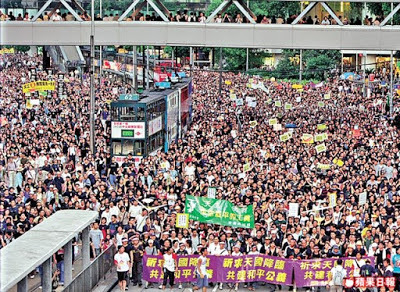 July 1st March, an annual ritual
July 1st March, an annual ritualCall it the Vic Park déjà vu. Three weeks after the raucous Tiananmen debate, Hong Kongers once again find themselves ruminating over yet another “should I stay or should I go” decision, this time about the July 1st march. In Hong Kong, taking to the streets on Handover Day has been something of a tradition. The march typically begins at Victoria Park, inches down Hennessy Road and finishes at the government headquarters. It is an annual outing for the public to vent their anger over a host of political and social issues, from the call for universal suffrage to the withdrawal of bad government bills and the protection of a free press.
Over the years, the Handover Day protest has taken on a carnival atmosphere. The entire westbound Hennessy Road and Queensway from Causeway Bay to Admiralty are turned into a pedestrian zone. Opposition political parties and advocacy groups set up colourful fund-raising booths along the route, handing out paper fans and selling paraphernalia. As a result, the march shares many of the same criticisms levelled against the Tiananmen vigil. This year, with C.Y Leung out of the picture and chief executive elect Carrie Lam yet to reveal what kind of villain she will be, march organizers are struggling to find a cause célèbre to fire up the public. A good turnout looks doubtful.
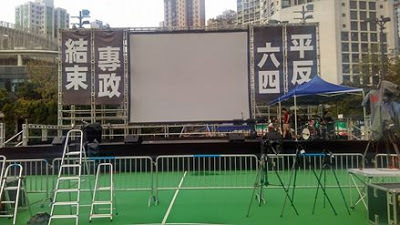 Low turnout at this year's Tiananmen Square vigil
Low turnout at this year's Tiananmen Square vigilSo in case you need a nudge to get off the couch and head over to Victoria Park on Handover Day, here are a few reasons why you should.
First, when it comes to large-scale demonstrations, numbers speak and size matters. In Hong Kong, protester turnout is one of the most reliable and closely watched barometers of public sentiment, which is why the police routinely underreports the numbers to downplay dissatisfaction toward the government. Since the handover, big rallies have resulted in major concessions from the authorities, most notably in 2003 when half a million citizens forced then chief executive Tung Chee-hwa to withdraw an anti-subversion bill, and in 2012 when 120,000 parents and students staged a sit-in in Tamar to thwart a patriotic education curriculum. A strong showing on this Handover Day will deliver a clear message to Carrie Lam that we are here to hold her and her rogue gallery of unpopular cabinet members to account. A low turnout, on the other hand, will give Lam plenty of bragging rights in front of her bosses up north.
Second, it is often said that a right not exercised is a right lost. Already, civil liberties in Hong Kong have been under threat on all fronts, from press and academic freedoms to the freedom to publish and protest. This year, the Victoria Park football pitches—the traditional starting point for the July 1st march—have been “pre-booked” for pro-Beijing celebrations, forcing marchers to convene on the nearby lawn, which may cause confusion and potential run-ins with the Chinese flag-waving revellers. Similarly, the Tsim Sha Tsui clock tower, a popular meeting place where the fringe localist group Hong Kong National Party has planned a vigil on June 30th, is suddenly off limits due to “public maintenance works.” If we choose to self-censor by staying home on Handover Day, we may be complicit in the government’s effort to curtail our constitutionally protected right of assembly.
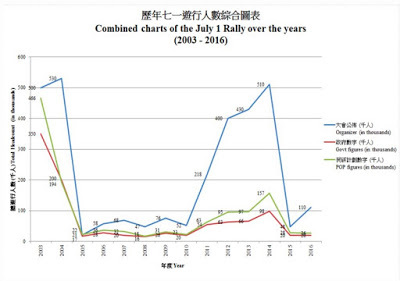 Low turnout expected at this year's July 1st march
Low turnout expected at this year's July 1st marchThird and most importantly, this year marks the 20th anniversary of the handover and President Xi Jinping is expected to grace us with his presence. The entire foreign press corps will descend on the city to cover the pomp and circumstance. What better occasion is there for Hong Kongers to make maximum noise and draw maximum attention to our grievances and demands? With the help of law enforcement, our government is determined to turn Xi’s visit into a tightly-controlled, Pyongyang-style tour by locking down large swaths of the city to keep out pesky protesters and filling the streets with minders and rent-a-crowds. We don’t need another North Korea, and we owe it to ourselves to show the Paramount Leader the real Hong Kong—one that our ruling elite don’t want their top boss to see.
If none of these reasons are enough to persuade you to join the march, then consider this: if Carrie Lam has her way and passes an anti-subversion bill within her first term, we might not, by the time the next milestone anniversary rolls around, have a chance to march down Hennessy Road chanting anti-Beijing slogans without risking arrest and prison. So enjoy your right while you still can.
The rally begins next Saturday at 3:00 pm from the Victoria Park lawn. March with the Progressive Lawyers Group (法政匯思) or look for their booth on the intersection of Hennessy Road and Tin Lok Lane (天樂里).
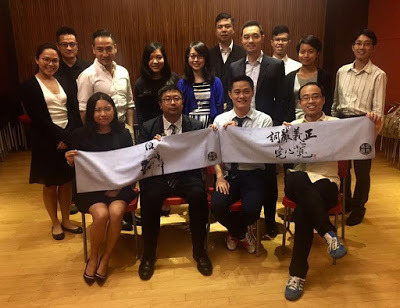 March with the Progressive Lawyers Group!
March with the Progressive Lawyers Group!____________________________________
This article appeared on Hong Kong Free Press under the title “Why Hong Kong's July 1 Democracy March isn't 'just another protest'."
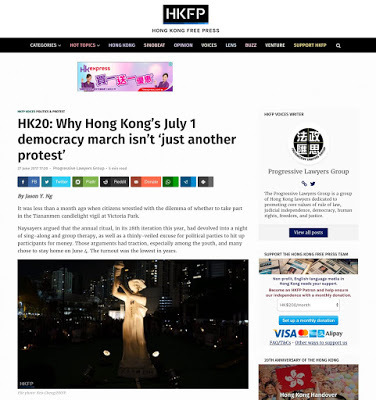 As posted on HKFP.com
As posted on HKFP.com
Published on June 27, 2017 05:28
Not Just Another March
It was less than a month ago when citizens wrestled with the dilemma of whether to take part in the Tiananmen candlelight vigil at Victoria Park. Naysayers argued that the annual ritual, in its 28th iteration this year, had devolved into a night of sing-along and group therapy, as well as a thinly-veiled excuse for political parties to hit up participants for money. Those arguments had traction, especially among the youth, and many chose to stay home on June 4th. The turnout was the lowest in years.
 July 1st March, an annual ritual
July 1st March, an annual ritualCall it the Vic Park déjà vu. Three weeks after the raucous Tiananmen debate, Hong Kongers once again find themselves ruminating over yet another “should I stay or should I go” decision, this time about the July 1st march. In Hong Kong, taking to the streets on Handover Day has been something of a tradition. The march typically begins at Victoria Park, inches down Hennessy Road and finishes at the government headquarters. It is an annual outing for the public to vent their anger over a host of political and social issues, from the call for universal suffrage to the withdrawal of bad government bills and the protection of a free press.
Over the years, the Handover Day protest has taken on a carnival atmosphere. The entire westbound Hennessy Road and Queensway from Causeway Bay to Admiralty are turned into a pedestrian zone. Opposition political parties and advocacy groups set up colourful fund-raising booths along the route, handing out paper fans and selling paraphernalia. As a result, the march shares many of the same criticisms levelled against the Tiananmen vigil. This year, with C.Y Leung out of the picture and chief executive elect Carrie Lam yet to reveal what kind of villain she will be, march organizers are struggling to find a cause célèbre to fire up the public. A good turnout looks doubtful.
 Low turnout at this year's Tiananmen Square vigil
Low turnout at this year's Tiananmen Square vigilSo in case you need a nudge to get off the couch and head over to Victoria Park on Handover Day, here are a few reasons why you should.
First, when it comes to large-scale demonstrations, numbers speak and size matters. In Hong Kong, protester turnout is one of the most reliable and closely watched barometers of public sentiment, which is why the police routinely underreports the numbers to downplay dissatisfaction toward the government. Since the handover, big rallies have resulted in major concessions from the authorities, most notably in 2003 when half a million citizens forced then chief executive Tung Chee-hwa to withdraw an anti-subversion bill, and in 2012 when 120,000 parents and students staged a sit-in in Tamar to thwart a patriotic education curriculum. A strong showing on this Handover Day will deliver a clear message to Carrie Lam that we are here to hold her and her rogue gallery of unpopular cabinet members to account. A low turnout, on the other hand, will give Lam plenty of bragging rights in front of her bosses up north.
Second, it is often said that a right not exercised is a right lost. Already, civil liberties in Hong Kong have been under threat on all fronts, from press and academic freedoms to the freedom to publish and protest. This year, the Victoria Park football pitches—the traditional starting point for the July 1st march—have been “pre-booked” for pro-Beijing celebrations, forcing marchers to convene on the nearby lawn, which may cause confusion and potential run-ins with the Chinese flag-waving revellers. Similarly, the Tsim Sha Tsui clock tower, a popular meeting place where the fringe localist group Hong Kong National Party has planned a vigil on June 30th, is suddenly off limits due to “public maintenance works.” If we choose to self-censor by staying home on Handover Day, we may be complicit in the government’s effort to curtail our constitutionally protected right of assembly.
 Low turnout expected at this year's July 1st march
Low turnout expected at this year's July 1st marchThird and most importantly, this year marks the 20th anniversary of the handover and President Xi Jinping is expected to grace us with his presence. The entire foreign press corps will descend on the city to cover the pomp and circumstance. What better occasion is there for Hong Kongers to make maximum noise and draw maximum attention to our grievances and demands? With the help of law enforcement, our government is determined to turn Xi’s visit into a tightly-controlled, Pyongyang-style tour by locking down large swaths of the city to keep out pesky protesters and filling the streets with minders and rent-a-crowds. We don’t need another North Korea, and we owe it to ourselves to show the Paramount Leader the real Hong Kong—one that our ruling elite don’t want their top boss to see.
If none of these reasons are enough to persuade you to join the march, then consider this: if Carrie Lam has her way and passes an anti-subversion bill within her first term, we might not, by the time the next milestone anniversary rolls around, have a chance to march down Hennessy Road chanting anti-Beijing slogans without risking arrest and prison. So enjoy your right while you still can.
The rally begins next Saturday at 3:00 pm from the Victoria Park lawn. March with the Progressive Lawyers Group (法政匯思) or look for their booth on the intersection of Hennessy Road and Tin Lok Lane (天樂里).
 March with the Progressive Lawyers Group!
March with the Progressive Lawyers Group!____________________________________
This article appeared on Hong Kong Free Press under the title “Why Hong Kong's July 1 Democracy March isn't 'just another protest'."
 As posted on HKFP.com
As posted on HKFP.com
Published on June 27, 2017 05:28
June 4, 2017
Lest We Remember? 毋念六四?
Today marks the 28th anniversary of the Tiananmen Square Massacre, known more delicately in this part of the world as the June 4th Incident. Members of the so-called “June 4th Generation”—people born in or before the 1980s who feel a deep connection with the thousands of student protesters murdered that summer—have always felt a sense of duty toward them: to vindicate their death, and until then, ensure that the younger generations do not forget what happened.
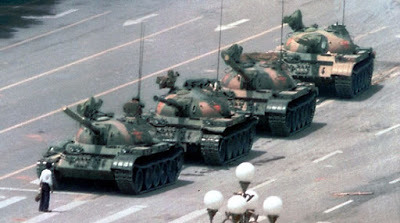 Impossible to forget
Impossible to forgetThe second duty is what compels parents to take their children to the Victoria Park candlelight vigil year after year, come rain or shine. The annual sit-in, organized by the Alliance in Support of Patriotic Democratic Movements of China (支聯會), fills several football pitches and features impassioned speeches, songs and prayers. Just like marching down Hennessy Road on July 1st and sweeping grandpa’s grave on Ching Ming Festival, it is one of those things that people do out of habit and respect. Since the Occupy Movement of 2014, every year in the lead-up to the massacre’s anniversary, university students will debate fiercely whether they should continue to partake into the Victoria Park memorial. Most of these discussions end in a decision to withdraw. Just today, the Chinese University Student Union issued a statement declaring the “end of the road for June 4thcommemoration.” They argue that the annual ritual has become a “tick-the-box” exercise: participants show up at the park, post a sad-faced selfie on Facebook and feel good about themselves for having “done something” when all they have really achieved is group therapy. They also believe that the pan-democratic parties have turned these memorials into fundraising campaigns and political shows.
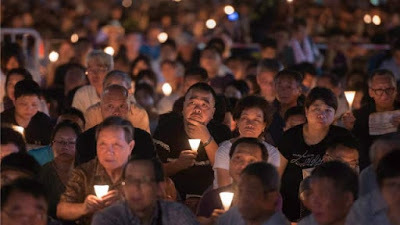 An annual ritual
An annual ritualSome students have gone further then that. Social media and online forums are plastered with memes and status posts with the rhetorical question: “What the F does June 4th have to do with me?” Their point is that Hong Kongers have nothing to gain from redressing the wrongs of the massacre, and to put less diplomatically, whatever happened in 1989 happened on the mainland to mainlanders and is therefore irrelevant to them and outside their agenda. Hong Kong people have enough on their plate fighting for greater autonomy and even independence from China. They won’t and can’t be bothered with what goes on north of the border.
Expectedly, these sentiments draw outrage and condemnation from older politicians, parents and teachers. The June 4th Generation pounced on the students, calling them sacrilegious and heartless. Likewise, the students hit back with their own name-calling, accusing the adults of being “Greater China plastic”—an epithet for those who talk incessantly about ending one-party rule in China without doing anything about it and who still believe that a better China will mean a better Hong Kong.
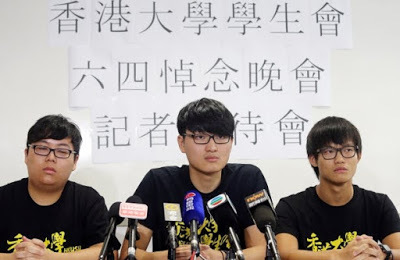 They don't see a point
They don't see a pointSo who is right and who is wrong?
The best way to arbitrate the dispute is to go back to one of our earlier examples: sweeping grandpa’s grave on Ching Min Festival. Doing so will allow us to isolate the two issues at hand and deal with them separately.
The first issue concerns whether one should attend the Victoria Park memorial. Here, the students have a point. If they are not interested in speeches and prayers, then why force them? If your kids don’t want to travel to faraway Wo Hop Shek Public Cemetery and trek up the hills just to burn incense in front of grandpa’s grave, then leave them at home. Yelling at them for not respecting their ancestors will only backfire. For all you know, your children have their own ways of remembering grandpa that don’t involve posing a fire hazard in Fanling or benefiting greedy florists who jack up the price of chrysanthemums every Ching Ming. Mom and dad should just take a chill pill and get on with their trip without the kids. Both sides are better off.
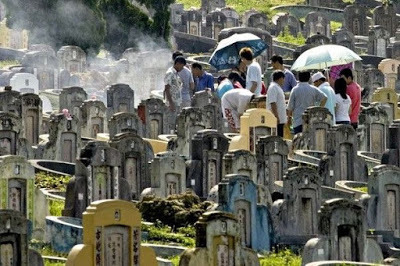 Grave-sweeping is not for everyone
Grave-sweeping is not for everyoneThe second issue, however, is altogether different—it is a question of ideology and basic human decency. Asking “what the F does June 4th have to do with me” is no less morally repugnant than saying “I don’t care if the Holocaust happened” or “the Paris terrorist attacks don’t matter to me.” Any liberal-minded person should take a stance against evil, murderous acts, whether you are Chinese, Hong Konger, French or Jewish. The isolationist approach to history and current events—the thinking that what happens elsewhere is relevant to me—is naïve and irresponsible. It is Donald Trump.
Worse, denying that Hong Kong is a part of China and that the city’s fate is intricately linked to that of the mainland is to think that the Earth is flat or to call global warming a hoax. The notion that Hong Kong can somehow have meaningful electoral reform and genuine democracy without a more politically open China is mind-boggling. Put more bluntly, university students and young politicians who talk night and day of achieving autonomy and independence without ever proposing a concrete plan or a viable path is simply another kind of “plastic”—the localist plastic.
So what I have to say is this: if you find the whole Ching Ming routine pointless and banal, all you have to do is stay home. You don’t need to say “who the F care about grandpa?” just because the old man died before you were born.
____________________________________
This article appeared on Hong Kong Free Press under the title “The Victoria Park Tiananmen vigil debate: Should you go, or stay at home?”
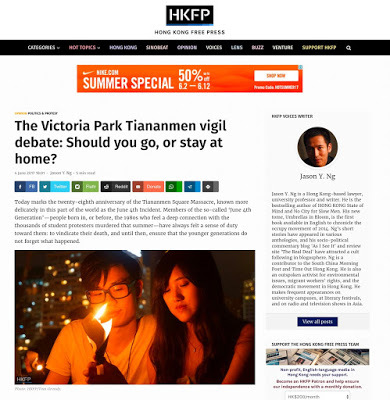 As posted on HKFP.com
As posted on HKFP.com
Published on June 04, 2017 03:04
Lest We Remember?
Today marks the 28th anniversary of the Tiananmen Square Massacre, known more delicately in this part of the world as the June 4th Incident. Members of the so-called “June 4th Generation”—people born in or before the 1980s who feel a deep connection with the thousands of student protesters murdered that summer—have always felt a sense of duty toward them: to vindicate their death, and until then, ensure that the younger generations do not forget what happened.
 Impossible to forget
Impossible to forgetThe second duty is what compels parents to take their children to the Victoria Park candlelight vigil year after year, come rain or shine. The annual sit-in, organized by the Alliance in Support of Patriotic Democratic Movements of China (支聯會), fills several football pitches and features impassioned speeches, songs and prayers. Just like marching down Hennessy Road on July 1st and sweeping grandpa’s grave on Ching Ming Festival, it is one of those things that people do out of habit and respect. Since the Occupy Movement of 2014, every year in the lead-up to the massacre’s anniversary, university students will debate fiercely whether they should continue to partake into the Victoria Park memorial. Most of these discussions end in a decision to withdraw. Just today, the Chinese University Student Union issued a statement declaring the “end of the road for June 4thcommemoration.” They argue that the annual ritual has become a “tick-the-box” exercise: participants show up at the park, post a sad-faced selfie on Facebook and feel good about themselves for having “done something” when all they have really achieved is group therapy. They also believe that the pan-democratic parties have turned these memorials into fundraising campaigns and political shows.
 An annual ritual
An annual ritualSome students have gone further then that. Social media and online forums are plastered with memes and status posts with the rhetorical question: “What the F does June 4th have to do with me?” Their point is that Hong Kongers have nothing to gain from redressing the wrongs of the massacre, and to put less diplomatically, whatever happened in 1989 happened on the mainland to mainlanders and is therefore irrelevant to them and outside their agenda. Hong Kong people have enough on their plate fighting for greater autonomy and even independence from China. They won’t and can’t be bothered with what goes on north of the border.
Expectedly, these sentiments draw outrage and condemnation from older politicians, parents and teachers. The June 4th Generation pounced on the students, calling them sacrilegious and heartless. Likewise, the students hit back with their own name-calling, accusing the adults of being “Greater China plastic”—an epithet for those who talk incessantly about ending one-party rule in China without doing anything about it and who still believe that a better China will mean a better Hong Kong.
 They don't see a point
They don't see a pointSo who is right and who is wrong?
The best way to arbitrate the dispute is to go back to one of our earlier examples: sweeping grandpa’s grave on Ching Min Festival. Doing so will allow us to isolate the two issues at hand and deal with them separately.
The first issue concerns whether one should attend the Victoria Park memorial. Here, the students have a point. If they are not interested in speeches and prayers, then why force them? If your kids don’t want to travel to faraway Wo Hop Shek Public Cemetery and trek up the hills just to burn incense in front of grandpa’s grave, then leave them at home. Yelling at them for not respecting their ancestors will only backfire. For all you know, your children have their own ways of remembering grandpa that don’t involve posing a fire hazard in Fanling or benefiting greedy florists who jack up the price of chrysanthemums every Ching Ming. Mom and dad should just take a chill pill and get on with their trip without the kids. Both sides are better off.
 Grave-sweeping is not for everyone
Grave-sweeping is not for everyoneThe second issue, however, is altogether different—it is a question of ideology and basic human decency. Asking “what the F does June 4th have to do with me” is no less morally repugnant than saying “I don’t care if the Holocaust happened” or “the Paris terrorist attacks don’t matter to me.” Any liberal-minded person should take a stance against evil, murderous acts, whether you are Chinese, Hong Konger, French or Jewish. The isolationist approach to history and current events—the thinking that what happens elsewhere is relevant to me—is naïve and irresponsible. It is Donald Trump.
Worse, denying that Hong Kong is a part of China and that the city’s fate is intricately linked to that of the mainland is to think that the Earth is flat or to call global warming a hoax. The notion that Hong Kong can somehow have meaningful electoral reform and genuine democracy without a more politically open China is mind-boggling. Put more bluntly, university students and young politicians who talk night and day of achieving autonomy and independence without ever proposing a concrete plan or a viable path is simply another kind of “plastic”—the localist plastic.
So what I have to say is this: if you find the whole Ching Ming routine pointless and banal, all you have to do is stay home. You don’t need to say “who the F care about grandpa?” just because the old man died before you were born.
____________________________________
This article appeared on Hong Kong Free Press under the title “The Victoria Park Tiananmen vigil debate: Should you go, or stay at home?”
 As posted on HKFP.com
As posted on HKFP.com
Published on June 04, 2017 03:04



